|
|
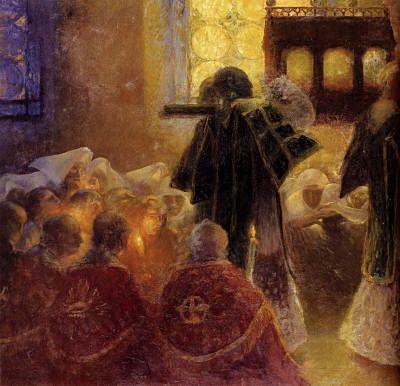
The Relics
Gaston La Touche
1854-1913
_______________________
Tangled Reliquary
Ann Lauterbach
Tangled reliquary under all surfaces.
Nothing moonlike occurs there
Only partial coves
And entrances.
How cool it must have been
the vat of the previous
Before these habits ordained the real.
Some of us must have seen each other
Naked in opulent dawn, our nerves
Drawn up as from an ancient well
Mossy, slick, unstuck at every seam
So we enter the sleeve of history
Out of which the magician pulls
His lawn ornaments: Dancer, Prancer,
Our Lady of Provocations, flags, targets,
The bluebird's house.
On the adjacent field
A swarm of butterflies alights
On a bald tree. This is the Tree of Changes
Mentioned in the lost book of A.
...(more)
Ann Lauterbach at PennSound and EPC
Before Recollection
Ann Lauterbach
google books
_______________________
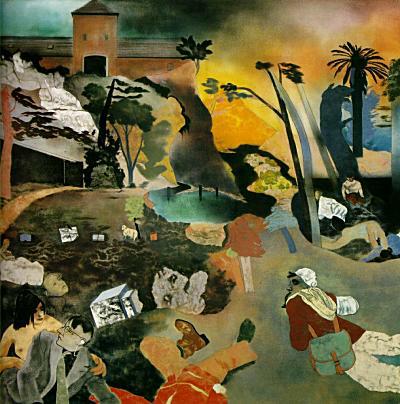
if not, not
R. B. Kitaj
b. 29 October 1932
_______________________
Bush Declares He Can Ignore Church/State Restrictions
Austin Cline
Under a secular government, it's very difficult to use religion to justify allowing small privileged groups to exercise undemocratic, unchecked power over others. It's always possible to develop completely secular defenses of unjust discrimination, but such arguments are susceptible to secular counter-argument. Faith-based justifications quickly and easily devolve to "God says so" and countering this (from a religious standpoint) requires either denying the underlying theology or simply opposing what God wants. Neither tends to be very effective, which is one reason why opposition to liberal secularism is so important for authoritarian, right-wing Christians.
Authoritarian religion is the best means for realizing their authoritarian political agenda and this, in turn, can more easily be realized by altering or ignoring the rules of secular government in order to create spaces where bigotry, discrimination, and injustice that would be illegal under secular circumstances are permitted so long as religious justifications can be found. Once firmly established, these spaces can be expanded while the space for fully secular and liberal services is diminished. Imposing religion from the top down has proven too difficult for the Christian Right, but the establishment of parallel social institutions which feed like parasites off the secular institutions they ultimately want to destroy is proving far more effective.
It would be a mistake at this point not to keep firmly in mind that the creation of parallel social institutions designed to supplant liberal public institutions was one of the key strategies of fascist political parties in the 1920s and 1930s. ...(more)
_______________________
"Say what you will about the sweet miracle of unquesting faith. I consider the capacity for it terrifying."
- Kurt Vonnegut
_______________________

Circa 1900
Halloween in the Time of Cholera
steve chasmar
via Plep - NY
_______________________
Like, Socialism
Hendrik Hertzberg
Sometimes, when a political campaign has run out of ideas and senses that the prize is slipping through its fingers, it rolls up a sleeve and plunges an arm, shoulder deep, right down to the bottom of the barrel. The problem for John McCain, Sarah Palin, and the Republican Party is that the bottom was scraped clean long before it dropped out.(....)
For her part, Sarah Palin, who has lately taken to calling Obama “Barack the Wealth Spreader,” seems to be something of a suspect character herself. She is, at the very least, a fellow-traveller of what might be called socialism with an Alaskan face. The state that she governs has no income or sales tax. Instead, it imposes huge levies on the oil companies that lease its oil fields. The proceeds finance the government’s activities and enable it to issue a four-figure annual check to every man, woman, and child in the state. One of the reasons Palin has been a popular governor is that she added an extra twelve hundred dollars to this year’s check, bringing the per-person total to $3,269. A few weeks before she was nominated for Vice-President, she told a visiting journalist—Philip Gourevitch, of this magazine—that “we’re set up, unlike other states in the union, where it’s collectively Alaskans own the resources. So we share in the wealth when the development of these resources occurs.” Perhaps there is some meaningful distinction between spreading the wealth and sharing it (“collectively,” no less), but finding it would require the analytic skills of Karl the Marxist. ...(more)
_______________________
Palin v. Ayers
The Specter of the Sixties
Gary Leupp
I think it important to combat the depiction of a distinguished scholar as a “terrorist” by the likes of Sarah Palin, whose ignorance and extremism terrify many. But I also think that the campaign might be doing us all a favor by drawing our attention to the 500 pound guerrilla in the room: the ’60s....(more)
_______________________
What Sarah Palin Is Saying
Anil Dash
...the most dramatic technique in Sarah Palin's speeches is the use of vernacular to mask the seriousness of an assertion. Sarah Palin cloaks her ideas in "straight talk" to avoid them being subject to fact-checking that would happen if she were to use standard english to make the same points.(....)
we see a simple pattern emerge:
* George W. Bush uses informal language like "smoke 'em out" when referring to targeting terrorists, setting the precedent of such terms being not only appropriate for the conversation, but in fact binding as policy.
* Bush, Palin and the Republican Party keep most media outlets on the defensive by consistently distancing the media with both fair assertions of bias and unfair attacks on the journalistic imperative to act as a check to political power.
* Palin sets a tone from her very first national speech where her deliberate use of vernacular explicitly connects her to rural white Americans.
* Palin defines Obama as linked to terrorism, ignoring the actual issue of domestic terrorism in favor of a context which is most likely to inspire radical elements of her audience to pursue the Bush policy of striking at friends of terrorists before they have attacked.
* Palin presses the argument using language that the mainstream press cannot grasp firmly enough to refute or highlight as incendiary.
I believe the vast majority of supporters of the campaign of John McCain are honorable, honest, well-intentioned and sincere Americans who want what's best for this country. And I believe that all of us, regardless of party affiliation or political support, deserve better than someone who cynically twists language to inflame and incite the very worst elements of our culture. That's why it's important to point out the danger of these actions.
Sarah Palin's conduct has gone far past the bounds of decency, and far past even the most dangerous efforts of any previous candidate for such high office. This is an inexcusable, unforgivable, and unacceptable transgression and my belief is that she should be removed from consideration for the office of Vice President for her dangerous, unethical and unamerican display of irresponsibility....(more)
_______________________
It's a grim binary choice, but apparently it came down to whether to make Palin look like a scripted robot or an unscripted ignoramus.
- Robert Draper
_______________________
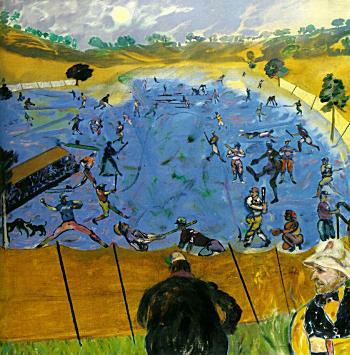 Amerika (Baseball)
R. B. Kitaj
_______________________
Consider Florida: The Great Vote Fraud Hoax
Linn Washington, Jr.
Contrary to McCainian claims of major registration fraud, the greatest voter fraud in recent history occurred during the 2000 presidential election where a massive Bush/GOP conspiracy robbed over 50,000 folks in Florida of their right to vote by falsely listing them as felons ineligible to cast ballots. Remembering that George W. Bush won Florida by a mere 534 vote margin in 2000, simple math exposes that GOP disenfranchisement fraud as demonstratively more devastating than some (alleged) fudging on registration forms.
McCainian claims of ACORN actions possibly “destroying the fabric of democracy” are inaccurate, insulting and hypocritical compared to the legacy of GOP voter suppression assaults – directed mostly at minorities – destruction of democracy that McCain doesn’t complain about.
_______________________
Crisis Theory In A Crisis Society
Interview with Norbert Trenkle (Krisis)
Interviewers and translators: Timo Ahonen and Markus Termonen. Originally made for the Finnish Magazine Megafoni
One of the results of this crisis is the dismantling of social systems which is taking place everywhere. However, I think it would be overly optimistic to say that it opens possibilities for a spontaneous cooperation. On the contrary. First of all, with this dismantling daily competition is increased and a desolidary climate is created. Of course, as a reaction to this crisis and social dismantling, different forms of self-help are simultaneously created, but as a rule they have the character of emergency measures, remain mostly group-particular, and rarely join together with a socio-critical orientation. They are therefore easily swallowed up by the neo-liberal crisis administration. It is not easy to answer the question of how to find a way out of this awkward situation. In any case, a resistance against the ever harsher unreasonable demands of the neo-liberal crisis administration is necessary. But this resistance can not only stop with a mere defense of the welfare state—which would anyway only be a perspective in the few countries of the capitalist center and then only at the expense of the rest of humanity—but must also develop into a movement which radically questions the foundations of capitalism: commodity and money, state and nation, work, and the patriarchal relations between the sexes.(....)
We do in fact have a quite critical relationship to postmodern theory or in any case to most theories that can be included under this label. However, I do think that some of them have produced important socio-cultural contributions. That is especially true of the critique of identity logic and identity politics with their repressive mechanisms of exclusion and inclusion, which is therewith interrelated with the analysis and critique of racism, sexism, nationalism, and all such related structures. Unfortunately, the consequence has mostly been an uncritical pluralism and relativism, which as such, is certainly compatible with capitalist logic. Moreover, uncritical pluralism and relativism in a sense correspond to the current phase of social development in which social atomization is constantly progressing, in which great flexibility and mobility is demanded, and in which capitalism is undermining institutions and identity (for example, politics and heterosexual relationships) of which it itself is dependent on, but without being able to put anything new in their place. To this situation, the often mentioned virtues of irony and ambivalence fit like a lid to its pot. They are at the very most critical up to the point (and normally not even that far) that the basic forms of society would have to be questioned. They stand for a continuation under social conditions whose absolute boundaries have been visible for a long time; this is suspected, however, but does not find a conscious expression. To that extent, one can say that the fundamental crisis of capitalism in a sense reflects itself in the postmodern theories, but without them being able to think about this, because on the level of totality, they have declared a ban on thinking....(more)
_______________________
 The Oak Tree
R. B. Kitaj
_______________________
General Motors asks Bush for $10bn to merge with Chrysler
_______________________
The art of not becoming accustomed to anything
Precarious employment in flexible capitalism
Klaus Ronneberger
In a sense, the cultural sector has become a testing ground for the "burn-out" of the commodity of working capacity. For the majority working in the cultural sector, standards such as productivity or flexibility – which they often condemn as capitalist disciplining – have become second nature. In this respect, they really are the avant-garde for post-Fordism, constantly opening up new avenues of self-exploitation. Values such as autonomy and self-realisation, along with feelings, experiences, creativity, which once were deployed to counter capitalist commoditisation, have now become significant raw material salvaged for economic ends. However, whilst management literature now lauds non-conformism as the key to professional success – almost as a glamour model for obedience to the imperatives of flexibilisation – the Berlin band Britta ask in the light of their increasingly precarious situation: "Is that bohemian or underclass?" ...(more)
_______________________
McCain's Rejected Robo-call Scripts
Jason Silverstein
via bertram online
_______________________

Seaport
Edward Alexander Wadsworth
b. 29 October 1889
_______________________
The Everyday
John Latta
Isola di Rifiuti
65
One cloud smudges out a
Considerable way, is lost behind
Black and fire-breach’d Max
Beckmann trees, “without distraction of
A literary nature.” One wants
To hint at depth through
Simple accumulation, make a mosaic
Of transience, blues and indifferently
Stain’d whites. ...(more)
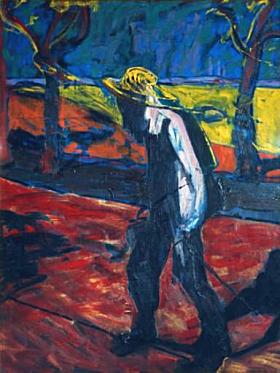
Study for a Portrait of Van Gogh
Francis Bacon
1957
_______________________
Time now for the trees to shroud the earth
with their dark branches, time
when the wind dies down,
and over the still mirror
a faded voice is whispering.
Time again to climb into the old
music-box in the forest,
and wind the iron spring –
it is letter by letter,
line by line.
Henry Gould
Poet's Corner - Fieralingue
_______________________

Study
after Velazquez's
Portrait of Pope Innocent X
Francis Bacon
1953
_______________________
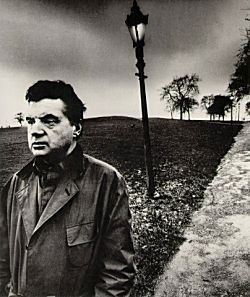
Francis Bacon
28 October 1909 – 28 April 1992
photo by Bill Brandt
_______________________
Sarah Palin Clarifies Response to Stevens Conviction
Sarah Palin's War on Science
The GOP ticket's appalling contempt for knowledge and learning.
Christopher Hitchens
The religious right, gone barking mad
Teresa Nielsen Hayden
Liars For Jesus
The Religious Right's Alternate Version of American History
Sarah Palin and the New Apostolic Reformation
Russ Bellant
YouTube Videos Draw Attention to Palin’s Faith
nyt
Sarah Palin and the Apocalypse
Merle Hoffman
On The Issues Magazine: Fall 2008
_______________________
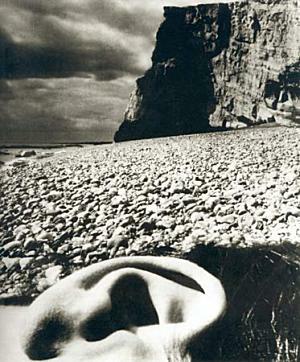
Bill Brandt
1 2 3 4
Bill Brandt: A Life
Paul Delany
Google Books
_______________________
Out of Shot
Seamus Heaney
November morning sunshine on my back
This bell-clear Sunday, elbows lodged strut-firm
On the unseasonably warm
Top bar of a gate, inspecting livestock,
Catching gleams of the distant Viking vik
Of Wicklow Bay; thinking scriptorium
Norse raids, night-dreads and that 'fierce warriors' poem
About storm on the Irish Sea - so no attack
In the small hours or next morning; thinking shock
Out of the blue or blackout, the staggered walk
Of a donkey on the TV news last night -
Loosed from a cart that had loosed five mortar shells
In the bazaar district, wandering out of shot
Lost to its owner, lost for its sunlit hills
_______________________
Chickenhawks and the Horrors of War
An Interview with Anthony Teolis, Veterans for Peace
Mike Whitney
_______________________
Looking Backward-McCain Style
Lincoln Mitchell
McCain's political identity was forged by the Cold War more than any candidate since Bob Dole 12 years ago and more than any president since George H. W. Bush. McCain is, in many respects, the last Cold War presidential candidate, albeit with a uniquely Republican flavor. He is, like many Cold War Republican candidates were, tough, gruff, a little mean, not entirely focused on or concerned about domestic issues such as the economy, and running a campaign based on being the most American of the candidates while subtly, and increasingly not so subtly, questioning the patriotism and even Americanism of his opponent. Obama, by contrast is not only the first real post-Cold War candidate, but, in some respects, the first candidate of the 21st century.(....)
The Republican campaign has collapsed among a sordid and backward looking combination of incompetence, red-baiting that feels bizarrely anachronistic and almost quaint, the growing acceptance among many in the Republican establishment that Sarah Palin is about as qualified to be president as I am to play first base for the Yankees, an adolescent, but deeply disturbing attempt to fake a racially charged attack on a McCain supporter, attempts to suggest that the Democratic president is a supporter of terrorism essentially because he has an unusual name and through ugly anti-Muslim bigotry. Lastly, the dreaded October surprise that many Democrats feared would turn this election upside down and defeat Obama turned out to be a shopping spree in which Republican handlers bought Sarah Palin $150,000 worth of clothes and makeup.
While the shopping spree and the uniquely unqualified vice-presidential candidate are somewhat sui generis, the red-baiting, terrorist-baiting, assault hoax and, most unambiguously, racist and violent comments made by McCain supporters at rallies suggest a fear and resistance of the future as represented by Obama who, make no mistake, represents a very different America to many voters. Sadly, McCain seems to view Obama this way too and has resorted to campaigning against him by focusing on this theme. The notions that Obama "pals around with terrorists", is a Marxist or, as Minnesota congresswoman Michele Bachmann suggested, that congress is dominated by enemies of America are, of course, outrageous, but they also evince a strong desire to hold onto the past on the part of McCain and his supporters. By alluding to incidents that happened almost 40 years ago and making charges that would have made Joe McCarthy proud they are, almost literally, fighting the last (Cold) war and using the language and imagery of that conflict as well. ...(more)
_______________________

Bill Brandt
_______________________
Introduction To The Discourse On The Dearth Of Reality
André Breton
Translated by Eugene Jolas
I do not like equivocation nor evasion. I stand in the vestibule of the chateau, lantern in hand, and throw the light upon one after another of the gleaming suits of armor. Who knows but that later on, in this same vestibule, someone will put on my own without thinking about it. From pedestal to pedestal a great mute colloquy goes on:"Listen. Don't you still hear the galloping of horses through the country? The sun of the dead shines in vain, even for them, the living running always at full speed in aid of the unaidable. They make it an affair of state."
— They were persuaded in the end that it was not their first and last life they were living. There is no harm in taking a chance, they say. As for us, let us knock on wood.
Woman's Voice. — Here are some who linger two by two. Have pity for them alone! Suits of armor, gleam more brightly! Lovers, love more and more!
— Can one being exist for another?...(more)
A Supplement to Imagining Language
edited by Tony Tost
_______________________
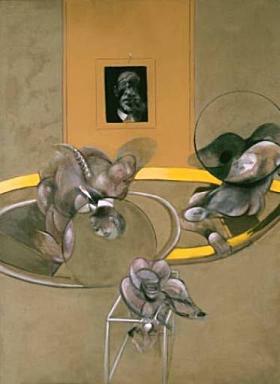
Three Figures and Portrait
Francis Bacon
1975
_______________________
10 Years Later, Misunderstood DMCA is the Law That Saved the Web
David Kravets
wired
Blogs, search engines, e-commerce sites, video and social-networking portals are thriving today thanks in large part to the notice-and-takedown regime ushered in by the much-maligned copyright overhaul. A decade ago, when the DMCA was enacted, these innovations were unheard of, embryonic or not yet conceived. Now, Google has grown into one of the world's largest companies, and its video-sharing site YouTube has left an enduring mark on public discourse. The Mountain View, California, company is one of many that openly acknowledges the DMCA's role in its success, a view shared by public interest groups....(more) _______________________
Infomobility and Technics: some travel notes
Belinda Barnet
The technical artefacts that surround us are more than just extensions of ourselves; they shape and mediate our experience of life and the taking place of space and time. Each technology has its own material genealogy that exceeds human evolution, and some developments have had more impact on human life than others. For French philosopher Bernard Stiegler, one of the most important developments in recent times is the convergence between the industrial technical system, globalisation, and mnemotechnical systems like writing and photography, to form a global mnemotechnical system. This system incorporates digital information networks like the internet as well as the real-time information events of individuals. The human of the information age is dependent on this global digital retention system; they invent themselves within it. More recently, with the development of geosynchronous satellite applications like GPS, there has been an "interweaving" of this global system with real space; the human experience of countries and regions is shaped in advance by its representations. The global mnemotechnical system reterritorialises real space.
What is currently being deployed is an electronic reproducibility of places, countries and geographical regions. It is not yet very advanced, but it already opens up immense perspectives.
The following essay is a collection of three vignettes reflecting on infomobility and mnemotechnics from my travels earlier this year(2005)....(more)
_______________________
GOODVOTE.ORG
When you go to vote, do you know what to do if someone tells you you're not on the list or there's a problem with your voter registration?
_______________________
What really worries Republicans about an Obama presidency, then, isn't simply the prospect that he will have a veto-proof majority in the Senate, one that has become even more likely with the Stevens imbroglio. It's also that the Justice Department would no longer be in the hands of pliable functionaries who have shielded the administration from the kind of scrutiny it deserves. While Obama will be preoccupied with mending a wrecked economy, more revelations of Bush administration misdeeds are sure to surface in coming months. In that sense, the downfall of the Alaska Senator could well be the tip of the iceberg.
-
Jacob Heilbrunn
_______________________
In Case You Weren't Scared Enough: Palin On "Fruit Fly Research"
Todd Palmer and Rob Pringle
Palin and the fruit fly
How the vice-presidential candidate became a laughing-stock among scientistsDown's syndrome, Alzheimer's disease, autism, diabetes, ageing research, cancers of all types: that's a minuscule range of diseases that have been and continue to be utterly dependent on the fruit fly. Eight seconds' worth of Googling would have revealed that to Palin. Maybe it's not obvious to the general public how basic research translates into clinically relevant knowledge. But so much of the information we have about the workings of genes and proteins and therefore diseases comes from studying these little critters.
Sarah Palin's comments display an attitude that is blatantly anti-science. Worse, it's lazy, ignorant and gleefully so. Somewhere along the line, the Republicans have endorsed a candidate who is so short-sighted and glib that she inadvertently mocks an indescribably important field of which she might have a personal knowledge. Whatever happens on November 4, the fruit fly's contribution to the public good will always far outweigh that of Sarah Palin, and she would do well to show some respect. ...(more)
_______________________
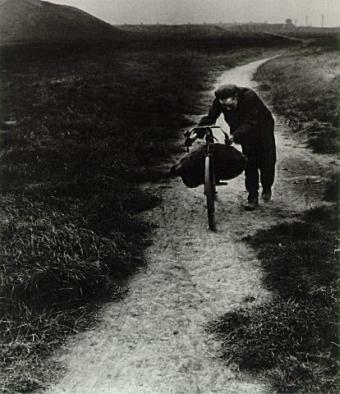
Coal Searcher
Going Home to Jarrow
Bill Brandt
1937
_______________________
Ten Poems
Grzegorz Wróblewski
translated from the Polish by Adam Zdrodowski
exquisite corpse
The Return of the Armada
In the flat country, poetry still flourishes:
Water-nymphs
stopped pestering me.
We should dig in the Jute peat bogs.
Certainly,
there lie there many brown men with slit
throats and seeds
in well-preserved entrails.
(Seamus Heaney should become an honorary
citizen of Aarhus.)
When will the armada I sent in 1970 in search of
Atahualpa’s rings return?
Rotten, Lilliputian ships – two-headed birds
will come out to greet them.
.....................................................
The New Polish Poetry
Jacket
Poems from Altered State — The New Polish Poetry. Edited by Rod Mengham, Tadeusz Pióro and Piotr Szymor. Todmorden, UK: Arc Publications, 2003. Price: £10.95. This selection was chosen by Rod Mengham and John Tranter.
 Adam Magyar
_______________________
Altarwise by Owl-Light
Dylan Thomas
Altarwise by owl-light in the half-way house
The gentleman lay graveward with his furies;
Abaddon in the hangnail cracked from Adam,
And, from his fork, a dog among the fairies,
The atlas-eater with a jaw for news,
Bit out the mandrake with to-morrows scream.
Then, penny-eyed, that gentlemen of wounds,
Old cock from nowheres and the heaven's egg,
With bones unbuttoned to the half-way winds,
Hatched from the windy salvage on one leg,
Scraped at my cradle in a walking word
That night of time under the Christward shelter:
I am the long world's gentlemen, he said,
And share my bed with Capricorn and Cancer.
Death is all metaphors, shape in one history;
The child that sucketh long is shooting up,
The planet-ducted pelican of circles
Weans on an artery the genders strip;
Child of the short spark in a shapeless country
Soon sets alight a long stick from the cradle;
The horizontal cross-bones of Abaddon,
You by the cavern over the black stairs,
Rung bone and blade, the verticals of Adam,
And, manned by midnight, Jacob to the stars.
Hairs of your head, then said the hollow agent,
Are but the roots of nettles and feathers
Over the groundowrks thrusting through a pavement
And hemlock-headed in the wood of weathers.
...(more)

Dylan Thomas
Oct. 27, 1914 - Nov. 9, 1953
The Poems of Dylan Thomas
google books
Quite Early One Morning
A collection of stories, essays, and poems
Dylan Thomas
google books
Dylan Thomas Selected Poems, 1934-1952
google books
Thomas at PoemHunter
_______________________
Socialism for Mavericks: To Each According to his Greed
Austin Cline
Jesus' General
Just about every Republican political campaign accuses Democrats of socialism and communism in some fashion, though they rarely come out and actually use such labels anymore. Instead, they usually rely on codes like "big government" and expect voters to get the message. Now that the alleged virtues of "small government" are out of fashion, new words for the same idea have to be found. What makes this attack interesting is just how bizarre and contrary to reality it is – not that any of his other personal attacks have exactly been "reality based," but the charge of socialism is so much further removed from reality that it almost makes all his earlier campaign moves seem rational by comparison.
Of course, by any educated and informed perspective (read: elitist, and therefore irrelevant), none of Barack Obama's policies come anywhere close to "socialism." He's just about as far removed from socialism as John McCain himself is, but that doesn't matter. Few of McCain's supporters actually know what socialism is. This includes the intelligent ones (I recently had a conversation with a man whose career was tied to finance and investments, yet he sincerely believed that socialism and communism were the same thing) as well as the not-so-intelligent ones (I saw a man interviewed by the BBC who said America had been fighting against socialism "since 1776"). They also don't care.
For conservative Republicans, "socialism" isn't so much a label for a particular economic theory or a set of economic policies as it is a code word for godlessness over Christianity, racial and economic equality over white, Protestant domination, collective action over individualism, internationalism over American exceptionalism, and so forth. Earlier, related complaints about "welfare" had the added benefit of being implied attacks on racial equality and giving blacks a chance at getting out of poverty.
Communism is generally taken to mean about the same thing, only a bit more extreme in terms of being anti-American, so I'm surprised that Obama hasn't been more explicitly labeled a communist as well. Trashing others as "red" in some fashion is an old and reliable Republican tactic that hasn't been made explicitly in many years. Maybe McCain is pining for the good old days when open, unapologetic red-baiting was more commonplace?...(more)
_______________________

The White Clown
1929
Walt Kuhn
27 October 1877 - 13 July 1949
_______________________
Uses for $700B bailout money ever shifting
Associated Press
First, the $700 billion rescue for the economy was about buying devalued mortgage-backed securities from tottering banks to unclog frozen credit markets.
Then it was about using $250 billion of it to buy stakes in banks. The idea was that banks would use the money to start making loans again.
But reports surfaced that bankers might instead use the money to buy other banks, pay dividends, give employees a raise and executives a bonus, or just sit on it. Insurance companies now want a piece; maybe automakers, too, even though Congress has approved $25 billion in low-interest loans for them....(more)
_______________________
Bush: 'Our Long National Nightmare Of Peace And Prosperity Is Finally Over'
The Onion
January 17, 2001
_______________________
Why Don’t Barack Obama and John McCain Talk About the Working Class?
democracy now
With the economy the number one issue on the campaign trail, major party candidates John McCain and Barack Obama discuss their tax plans, jobs and the financial bailout on the stump. But are they really addressing the needs of the working class? A new study from the Center for the Study of Working Class Life suggests that neither McCain nor Obama have adequately spoken to the needs of one-fifth of the population—the 60 million Americans who are barely surviving in this economy.
Economic Stimulus and Economically Distressed Workers
Michael Zweig, Junyi Zhu, and Daniel Wolman
a report from the Center for Study of Working Class Life
_______________________
Mario Tronti, Politics at Work
The ideological hegemony of the Right - your boss's interest is your interest, and you should do things on your own and not with others - does not stop before the factory gates, just like it doesn't wait in front of the entrance to the home, where the holy family dwells. It enters, penetrates, invades, conquers, seizing hold of the soul - if there is no body of collective forces that pushes it back, countering it with the reasons of an organised solidarity. The material condition of subaltern labour - whether dependent or autonomous, stable or precarious - must now face up to this politically unprecedented situation, that the middle classes no longer need to be a separate social stratum, because they have become a diffuse democratic mentality. This is an illusory veil which the presence of an alternative horizon, both credible and practicable, has the duty to rend asunder.
But who today denounces the evils of society?...(more)
Translation courtesy of Savonarola at the Institute for Conjunctural Research
_______________________

Lost Rivers
Alejandro Cartagena
via Flak Photo
_______________________
The Financial Crisis
Jacques-Alain Miller
The monetary signifier is one of semblance, which rests on social conventions. The financial universe is an architecture made of fictions and its keystone is what Lacan called a “subject supposed to know”, to know why and how. Who plays this part? The concert of authorities, from where sometimes a voice is detached, Alan Greenspan, for example, in his time. The financial players base their behavior on this. The fictional and hyper-reflexive unit holds by the “belief” in the authorities, i.e. through the transference to the subject supposed to know. If this subject falters, there is a crisis, a falling apart of the foundations, which of course involves effects of panic. However, the financial subject supposed to know was already quite subdued because of deregulation. And this happened because the financial world believed, in its infatuated delusion, to be able to work things out without the function of the subject supposed to know. Firstly, the real state assets become waste. Secondly, gradually shit permeates everything. Thirdly, there is a gigantic negative transfer vis-à-vis the authorities; the electric shock of the Paulson/Bernanke plan angers the public: the crisis is one of trust; and it will last till the subject supposed to know is reconstructed. This will come in the long term by way of a new set of Bretton Woods accords, a council enjoined to speak the truth about the truth....(more)
_______________________
Paul Virilio on the crisis
translated by Patrice Riemens
For thirty years now, the phenomenon of History accelerating has been negated, together with the fact that this acceleration has been the prime cause of the proliferation of major accidents. Freud said it, speaking of death: "accumulation snuffs out the perception of contingency". Contingency is the key word here. These accidents are not contingent occurrences. For the time being, the prevalent opinion is that researching the crash of the stock exchange as a political and economic issue and in terms of its social consequences is adequate enough. But it is impossible to understand what is going on if one does not implement a (policy based on the) political economy of speed, the speed that technological progress engenders, and if one does not link (this policy) to the 'accidental' character of History.
Let's take just one example: the dictum "time is money". I add to this, and the stock exchange testify to it: "speed is power". We have moved from the stage of the acceleration of History to that of the acceleration of the Real. This is what 'the progress' is: a consensual sacrifice....(more)
Radical Perspectives on the Crisis
_______________________
The Saturated Generic Identity of the Working Class
An Interview with Alain Badiou
2006
The question of the political process is always a question that goes beyond identities. It's the question of finding something that is, paradoxically, a generic identity, the identity of no-identity, the identity which is beyond all identities. ... Probably that function of the working class is saturated. We cannot substitute a mere collection of identities for the saturated generic identity of the working class. I think we have to find the political determination that integrates the identities, the principles of which are beyond identity. The great difficulty is to do that without something like the working class. Without something that was a connection between particularity and universality, because that's what the working class was. The particularity of the working class was its location in a singular place; the working class was generic. The solution of the problem for Marxism was the human group which is not really an identity, which is beyond identity.
We have to do the same thing, but probably without that sort of solution....(more)
_______________________

photo - mw
_______________________
Meanwhile on this side of the St. Lawrence
When Stephen Harper observed during the recent campaign that the country had become a lot more conservative since he first entered politics, he was right. And in the growth of that conservatism, fiscal and social, the things we used to cherish as constituent parts of our identity have begun to wither.
Canada in 2008 is not the Canada of Lester Pearson, Tommy Douglas, Pierre Trudeau or any of the other figures from both sides of the House who worked to incorporate human ideals into our daily national life. Canada in 2008 is a nation that chooses combat over peacekeeping, that has begun a debate on the desirability of eroding Medicare, that thinks the justice of the Just Society has a spectacular array of limitations.
In today's Canada, it's perfectly acceptable to: sneer at gun control; pretend poverty and environmental crises will disappear; turn a blind eye to the imprisonment and documented torture of fellow Canadians; call for the return of capital punishment; be ugly and suspicious about immigration; renege shamefully on our promise of foreign aid; deny civil liberties in the name of a made-in-America paranoia ... well, the list really could go on and on. Add your own depressing item to it.
-
Janice Kennedy, The Ottawa Citizen
_______________________
Conversation Among the Ruins
Sylvia Plath
b. October 27, 1932
Through portico of my elegant house you stalk
With your wild furies, disturbing garlands of fruit
And the fabulous lutes and peacocks, rending the net
Of all decorum which holds the whirlwind back.
Now, rich order of walls is fallen; rooks croak
Above the appalling ruin; in bleak light
Of your stormy eye, magic takes flight
Like a daunted witch, quitting castle when real days break.
Fractured pillars frame prospects of rock;
While you stand heroic in coat and tie, I sit
Composed in Grecian tunic and psyche-knot,
Rooted to your black look, the play turned tragic:
Which such blight wrought on our bankrupt estate,
What ceremony of words can patch the havoc?
_______________________

Meadowlands
Joshua Lutz
_______________________
How Shall My Animal
Dylan Thomas
How shall my animal
Whose wizard shape I trace in the cavernous skull,
Vessel of abscesses and exultation's shell,
Endure burial under the spelling wall,
The invoked, shrouding veil at the cap of the face,
Who should be furious,
Drunk as a vineyard snail, flailed like an octopus,
Roaring, crawling, quarrel
With the outside weathers,
The natural circle of the discovered skies
Draw down to its weird eyes?
How shall it magnetize,
Towards the studded male in a bent, midnight blaze
That melts the lionhead's heel and horseshoe of the heart
A brute land in the cool top of the country days
To trot with a loud mate the haybeds of a mile,
Love and labour and kill
In quick, sweet, cruel light till the locked ground sprout
The black, burst sea rejoice,
The bowels turn turtle,
Claw of the crabbed veins squeeze from each red particle
The parched and raging voice?
Fishermen of mermen
Creep and harp on the tide, sinking their charmed, bent pin
With bridebait of gold bread, I with a living skein,
Tongue and ear in the thread, angle the temple-bound
Curl-locked and animal cavepools of spells and bone,
Trace out a tentacle,
Nailed with an open eye, in the bowl of wounds and weed
To clasp my fury on ground
And clap its great blood down;
Never shall beast be born to atlas the few seas
Or poise the day on a horn.
Sigh long, clay cold, lie shorn,
Cast high, stunned on gilled stone; sly scissors ground in frost
Clack through the thicket of strength, love hewn in pillars drops
With carved bird, saint, and suns the wrackspiked maiden mouth
Lops, as a bush plumed with flames, the rant of the fierce eye,
Clips short the gesture of breath.
Die in red feathers when the flying heaven's cut,
And roll with the knocked earth:
Lie dry, rest robbed, my beast.
You have kicked from a dark den, leaped up the whinnying light,
And dug your grave in my breast.
_______________________
Badiou and the Ethics of Prose: Revaluing Beckett
Claire Joubert
"Philosophy is the construction of the formal possibility of something that would break with what Badiou calls the 'febrile sterility' of the contemporary world. He calls this an 'event', and the only question of politics, for Badiou, is whether there is something that might be worthy of the name 'event'. If philosophy is understood, as Heraclitus had it, as a 'seizure by thought', then politics is a revolutionary seizure of power that breaks with the dreamless sleep of an unjust and violently unequal world."
-
Simon Critchley
Anti-events: reviewing Badiou
Stephen Mitchelmore
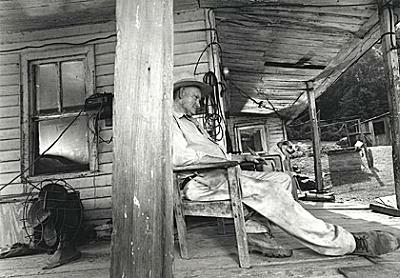
Lawrence's Porch
Shelby Lee Adams
The True Meaning of Pictures: Shelby Lee Adams' Appalachia
Kathleen Cummins
Take One, March-May, 2003
_______________________
Of Which Real is this Crisis the Spectacle?
Alain Badiou
updated translation at infinite thØught
We will have time later to wonder (the saga will surely continue) where these billions come from, given that for some years, at the least demand from the poor, the same characters responded by turning their pockets inside out, saying they hadn't a cent. (....)
The ordinary citizen must ‘understand’ that it is impossible to make up the shortfall in social security, but that it is imperative to stuff untold billions into the banks’ financial hole? We must sombrely accept that no one imagines any longer that it’s possible to nationalise a factory hounded by competition, a factory employing thousands of workers, but that it is obvious to do so for a bank made penniless by speculation? In this business, the real is to be found on the hither side of the crisis. ...(more)
http://www.cinestatic.com/infinitethought/2008/10/badiou-on-financial-crisis.asp
_______________________
The pounce-boxes of our days have gone retrograde.
The South-Sea HouseCharles Lamb Essays of Elia
 Situated as thou art, in the very heart of stirring and living commerce, -- amid the fret and fever of speculation -- with the Bank, and the `Change, and the India-house about thee, in the hey-day of present prosperity, with their important faces, as it were, insulting thee, their poor neighbour out of business -- to the idle and merely contemplative,to such as me, old house! there is a charm in thy quiet -- a cessation -- a coolness from business -- an indolence almost cloistral -- which is delightful! With what reverence have I paced thy great bare rooms and courts at eventide! They spoke of the past -- the shade of some dead accountant, with visionary pen in ear, would flit by me, stiff as in life. Living accounts and accountants puzzle me. I have no skill in figuring. But thy great dead tomes, which scarce three degenerate clerks of the present day could lift from their enshrining shelves with their old fantastic flourishes, and decorative rubric interlacing their sums in triple columniations, set down with formal superfluity of cyphers with pious sentences at the beginning, without which our religious ancestors never ventured to open a book of business, or bill of lading -- the costly vellum covers of some of them almost persuading us that we are got into some better library, are very agreeable and edifying spectacles. I can look upon these defunct dragons with complacency. Thy heavy odd-shaped ivory-handled penknives (our ancestors had every thing on a larger scale than we have hearts for) are as good as any thing from Herculaneum. The pounce-boxes of our days have gone retrograde. ...(more) Situated as thou art, in the very heart of stirring and living commerce, -- amid the fret and fever of speculation -- with the Bank, and the `Change, and the India-house about thee, in the hey-day of present prosperity, with their important faces, as it were, insulting thee, their poor neighbour out of business -- to the idle and merely contemplative,to such as me, old house! there is a charm in thy quiet -- a cessation -- a coolness from business -- an indolence almost cloistral -- which is delightful! With what reverence have I paced thy great bare rooms and courts at eventide! They spoke of the past -- the shade of some dead accountant, with visionary pen in ear, would flit by me, stiff as in life. Living accounts and accountants puzzle me. I have no skill in figuring. But thy great dead tomes, which scarce three degenerate clerks of the present day could lift from their enshrining shelves with their old fantastic flourishes, and decorative rubric interlacing their sums in triple columniations, set down with formal superfluity of cyphers with pious sentences at the beginning, without which our religious ancestors never ventured to open a book of business, or bill of lading -- the costly vellum covers of some of them almost persuading us that we are got into some better library, are very agreeable and edifying spectacles. I can look upon these defunct dragons with complacency. Thy heavy odd-shaped ivory-handled penknives (our ancestors had every thing on a larger scale than we have hearts for) are as good as any thing from Herculaneum. The pounce-boxes of our days have gone retrograde. ...(more)
courtesy of ads without products_______________________
The Promises of Monsters:
A Regenerative Politics for Inappropriate/d Others
Donna Haraway
Lawrence Grossberg, Cary Nelson, Paula A. Treichler, eds., Cultural Studies (New York; Routledge, 1992) , pp. 295-337.
"The Promises of Monsters" will be a mapping exercise and travelogue through mind-scapes and landscapes of what may count as nature in certain local/global struggles. These contests are situated in a strange, allochronic time-the time of myself and my readers in the last decade of the second Christian millenium-and in a foreign, allotopic place-the womb of a pregnant monster, here, where we are reading and writing. The purpose of this excursion is to write theory, i.e., to produce a patterned vision of how to move and what to fear in the topography of an impossible but all-too-real present, in order to find an absent, but perhaps possible, other present. I do not seek the address of some full presence; reluctantly, I know better. Like Christian in Pilgrim's Progress, however, I am committed to skirting the slough of despond and the parasite-infested swamps of nowhere to reach more salubrious environs. The theory is meant to orient, to provide the roughest sketch for travel, by means of moving within and through a relentless artifactualism, which forbids any direct si(gh)tings of nature, to a science fictional, speculative factual, SF place called, simply, elsewhere. At least for those whom this essay addresses, "nature" outside artifactualism is not so much elsewhere as nowhere, a different matter altogether. Indeed, a reflexive artifactualism offers serious political and analytical hope. This essay's theory is modest. Not a systematic overview, it is a little siting device in a long line of such craft tools. Such sighting devices have been known to reposition worlds for their devotees-and for their opponents. Optical instruments are subject-shifters. Goddess knows, the subject is being changed relentlessly in the late twentieth century.
My diminutive theory's optical features are set to produce not effects of distance, but effects of connection, of embodiment, and of responsibility for an imagined elsewhere that we may yet learn to see and build here. I have high stakes in reclaiming vision From the technopornographers, those theorists of minds, bodies, and planets who insist effectively--i.e., in practice--that sight is the sense made to realize the fantasies of the phallocrats. I think sight can be remade for the activists and advocates engaged in fitting political filters to see the world in the hues of red, green, and ultraviolet, i.e., from the perspectives of a still possible socialism, feminist and anti-racist environmentalism, and science for the people. I take as a self-evident premise that "science is culture." Rooted in that premise, this essay is a contribution to the heterogeneous and very lively contemporary discourse of science studies as cultural studies. Of course, what science, culture, or nature-and their "studies"-might mean is far less self-evident....(more)
_______________________
 Articles of Faith
storefront African American churches
Dave Jordano
via Heading East
_______________________
B'-grade hoax reveals the GOP's inner race-baiter
David Neiwert
Embracing Their Inner Klansman
the "Scary Negro beat me up for loving America" hoax...
driftglass
The Sad, Sordid Case Of Ashley Todd
Dana Goldstein
Individuals who invent stories of victimization are often mentally ill, and deserve some modicum of compassion. But there's no question that in both of these cases, the lies were manufactured to whip up racial hatred. Equally bad, people who fabricate tales of violence do a real disservice to women and men who are actually victims of violent crimes. Our culture is already filled with insinuations that women in particular make-up or "exaggerate" accusations of assault, sexual harassment, and rape.
All in all, this little episode is an example of one individual crafting a narrative intended to play off an image of Barack Obama and his supporters (as radical, terroristic, and racially-motivated) that is being pushed by the McCain campaign. Sad and sordid....(more)
.....................................................
Todd is not the only sicko is this drama. So are the McCain campaign functionaries who steered the news media to the story, including Peter Feldman, McCain’s Pennsylvania communications director, who made sure that reporters were aware that the “B” carved into Todd’s cheek stood for “Barack.”
And while we’re on the subject, let’s stop calling this a hoax.
To me a hoax is the Piltdown Man or the Cottingley Fairies. Sure, people get embarrassed, but no one gets hurt. In this case every black man in America got hurt, including the man that the “B” was intended to hurt.
- Shaun Mullen
_______________________
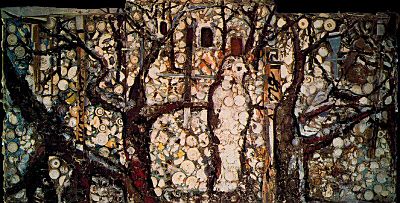 A Student of Prague
Julian Schnabel
b. Oct 26 1951
1 2 3
The double life of Julian:
how the bad boy painter turned fêted director
Arifa Akbar and Rob Sharp
_______________________
Financial Regime Change?
Robert Wade
Neoliberal economics has powerful antibodies against evidence contrary to its way of seeing things. However, the current crisis may be severe enough to awaken economists from the ‘deep slumber of a decided opinion’, and render them more receptive to proof that the post-Cold War globalization consensus has strikingly weak empirical foundations.(....)
In times of crisis, arguments that had previously been on the margins can gain greater currency. If the disappearance of three out of five big investment banks indicates the seriousness of the present turmoil, it also provides an opportunity to broaden the range of possibilities for an overhaul of the way global finance operates; the fall in pension funds and declining house prices should also enlarge the constituency for major reform. Scholars today face the challenge of rethinking some of the basic intellectual models that have legitimized policy over the past three decades. The fallout from complex, opaque financial products may persuade many of the benefits of a substantially smaller financial sector relative to the real one, and perhaps of a ‘mixed economy’ in finance, where some firms would combine public and private purposes—operating more like utilities than profit maximizers.
But more fundamentally, the globalization model itself needs to be rethought. ...(more)
_______________________

Donnie with Baby & Cows
Shelby Lee Adams 1 2 3 4
_______________________
Lingos I - IX
Ulf Stolterfoht
translated from the German by Rosmarie Waldrop
Lingos I
(1)
he also verb meanly enough into the noun
breeds his good cause so stantive under pre
as he says/if he throws - now punctuates
the inter or tactically presses it with with
in part how far - a leading question -
craving and gender are willing to share
a role in whose: ramified case of big bang
aftermath in zwolle or half-mast colon
infusion in walk-tide - he verb it just right:
inflects the flecked beast but injects no
future around ur-conjunct or aur-adject
he'll infinite and deeper yet for
clature lies heavy on his nomen: when to
close the if-clause out of the frying pan from
rela on - if sub ordinates the tone? over
pluperfect metals let thickets grow thick
...(more)
hilda magazine
_______________________

Dave Jordano

photo - mw
_______________________
Everything That Acts is Natural
Denise Levertov
October 24, 1923 - December 20, 1997
From the tawny light
from the rainy nights
from the imagination finding
itself and more than itself
alone and more than alone
at the bottom of the well where the moon lives,
can you pull me
into December? a lowland
of space, perception of space
towering of shadows of clouds blown upon
clouds over
new ground, new made
under heavy December footsteps? the only
way to live?
The flawed moon
acts on the truth, and makes
an autumn of tentative
silences.
You lived, but somewhere else,
your presence touched others, ring upon ring,
and changed. Did you think
I would not change?
The black moon
turns away, its work done. A tenderness,
unspoken autumn.
We are faithful
only to the imagination. What the
imagination
seizes
as beauty must be truth. What holds you
to what you see of me is
that grasp alone.
_______________________
Object Lessons
Pleasing Deceptions
Wendy Bellion
common-place
The problem of deception was social as well as epistemological. Shell games and card tricks, curative potions, and alchemical transformations: the specter of dissimulation, of the senses intentionally fooled, deeply troubled a world in which knowledge was meant to be acquired through observation. The cast of types suspected of employing deceptive strategies for personal gain was diverse. Confidence men, forgers, counterfeiters, magicians, artists, demagogues—even jugglers, ventriloquists, and dancing masters—were often named as agents of social disorder. Catholics and Jesuits came under attack as purveyors of "priestcraft" and smoke-and-mirrors ritual. (Indeed, the most enduring emblem of deceit was religious in nature: the devil himself in the disguise of the serpent.) Gamesters were also easy targets. Card sharps and gamblers were associated with the egregious greed of financial speculation and the suspect value of paper currency, which Thomas Jefferson once called "legerdemain tricks upon paper."...(more)
_______________________
...there is a nostalgia for the abstractions of Modernism that amounts to reducing it to a mere style among many others. That appears to be finely democratic with regard to offering choices, but it is a false choice if the abstractions resemble the old ones, which have by now become comfortable representations of a lost innocence. Abstraction, like democracy, is demanding of each of us—often discomfiting, and always difficult to attain.
- Lebbeus Woods
_______________________
There is a profound difference, in other words, between the questioner who cares about the answer and the one who cares only to dismiss the answer.
(...)
There is no wisdom without that unease, and no chance to do anything but to leave the world of meaning exactly as we find it. The world without wonder is not a world entirely without meaning; on the contrary, everything means exactly what we already thought it did. But this is meaning that never goes beyond the glib certainty of a newspaper column, the depressing sameness of a situation comedy. By contrast, it takes a certain kind of courage -- or just a certain kind of perversity -- not to 'understand' everything, but instead to welcome unease and put it at the centre of one's life.
- Mark Kingwell
_______________________
Juicing up the ticket
Garrison Keillor
It was dishonest, cynical men who put forward a clueless young woman for national office, hoping to juice up the ticket, hoping she could skate through two months of chaperoned campaigning, but the truth emerges: The lady is talking freely about matters she has never thought about. The American people have an ear for B.S. They can tell when someone's mouth is moving and the clutch is not engaged. When she said, "One thing that Americans do at this time, also, though, is let's commit ourselves just every day, American people, Joe Six-Pack, hockey moms across the nation, I think we need to band together and say never again. Never will we be exploited and taken advantage of again by those who are managing our money and loaning us these dollars," people smelled gas.
Some Republicans adore her because they are pranksters at heart and love the consternation of grown-ups. The ne'er-do-well son of the old Republican family as president, the idea that you increase government revenue by cutting taxes, the idea that you cut social services and thereby drive the needy into the middle class, the idea that you overthrow a dictator with a show of force and achieve democracy at no cost to yourself -- one stink bomb after another, and now Gov. Palin.
She is a chatty sportscaster who lacks the guile to conceal her vacuity, and she was Mr. McCain's first major decision as nominee. This troubles independent voters, and now she is a major drag on his candidacy. She will get a nice book deal from Regnery and a new career making personal appearances for 40 grand a pop, and she'll become a trivia question, "What politician claimed foreign-policy expertise based on being able to see Russia from her house?" And the rest of us will have to pull ourselves out of the swamp of Republican economics....(more)
via the revived MobyLives a production of Melville House Press
_______________________

Ellen Kooi
1 2 3
_______________________
In the same time, Senator John McCain of Arizona has retreated farther and farther to the fringe of American politics, running a campaign on partisan division, class warfare and even hints of racism. His policies and worldview are mired in the past. His choice of a running mate so evidently unfit for the office was a final act of opportunism and bad judgment that eclipsed the accomplishments of 26 years in Congress.
Given the particularly ugly nature of Mr. McCain’s campaign, the urge to choose on the basis of raw emotion is strong. But there is a greater value in looking closely at the facts of life in America today and at the prescriptions the candidates offer. The differences are profound.
- nyt endorses Obama
_______________________
McCain feels with his heart, but he thinks with his base. And when he picked Sarah Palin, he told the United States of America to go fuck itself. I used to think of my dilemma this way: Obama's conception of America is better than he is, McCain's conception of America is worse than he is. But McCain is looking more and more like his America, which is Bush's America: a country of capitalists and Christians. I do not know how to explain what has become of him. But the more I regard him, the more I recall Gene's ominous words. You vote for the man.
-
Leon Wieseltier
_______________________
Republicans Voting for Obama: In Their Own Words
_______________________
The Manchurian Electorate
Understanding the Right #2
driftglass
These people are hard-wired, burned-on-the-fucking-motherboard authoritarians who have all the behavioral and psychological range-of-motion of trained seals. What is genuinely dangerous about the Right is not their professed ideology (a shoebox-full of elitist abstractions about markets and men that has as little to do with human nature as 11th dimensional geometries have to do with getting me from here to the laundromat) or even their actual ideology (which,as Molly Ivins famously said about Pat Buchanan’s RNC speech in 1998, ‘... probably sounded better in the original German’).(....)
Compared to Conservatism, cigarettes are a mild and easily given-up leisure activity. They constitute a Manchurian Electorate: a 40-million-strong Confederate sleeper cell that can be flicked off and on like a switch, and whose furies and adulation can be modulated like burners on a camp stove....(more)
_______________________
So Long, Suckers.
Millionaire hedge fund boss thanks 'idiot' traders and retires at 37
_______________________
Greenspan Concedes Error on Regulation
"I made a mistake in presuming that the self-interests of organizations, specifically banks and others, were such as that they were best capable of protecting their own shareholders and their equity in the firms," Mr. Greenspan said.
Referring to his free-market ideology, Mr. Greenspan added: "I have found a flaw. I don't know how significant or permanent it is. But I have been very distressed by that fact."
Mr. Waxman pressed the former Fed chair to clarify his words. "In other words, you found that your view of the world, your ideology, was not right, it was not working," Mr. Waxman said.
"Absolutely, precisely," Mr. Greenspan replied. "You know, that's precisely the reason I was shocked, because I have been going for 40 years or more with very considerable evidence that it was working exceptionally well."
_______________________
Collateral Damage: How The War on Terror Hurts Charities, Foundations and the People They Serve (pdf)
Nancy Billica
Philanthropy, Counterterrorism and Global Civil Society Activism (pdf)
Nancy Billica via Gift Hub
_______________________
"Interrogation Psychologists" and the Allure of "National Security Psychology"
_______________________
A Dystopian Perspective on the Coming Global Recession
...we are about to experience a serious decline in the quality of life, if one defines we as the middle and upper middle class of the developed world. The relaxed assurance that comes with knowing that the system works for us, and will continue to effortlessly convey consumer goods to us to fulfill our daily needs, whether real or perceived, is about to end. In other words, we are about to discover how the vast of majority of the world has lived under neoliberalism, and even the more benign aspects of it that we will experience are not going to be very pleasant.
_______________________

Hommage à Gustav Mahler
Nils Udo
1973 1 2 3
_______________________
The Jacob's Ladder
Denise Levertov
The stairway is not
a thing of gleaming strands
a radiant evanescence
for angels' feet that only glance in their tread, and need not
touch the stone.
It is of stone.
A rosy stone that takes
a glowing tone of softness
only because behind it the sky is a doubtful, a doubting
night gray.
A stairway of sharp
angles, solidly built.
One sees that the angels must spring
down from one step to the next, giving a little
lift of the wings:
and a man climbing
must scrape his knees, and bring
the grip of his hands into play. The cut stone
consoles his groping feet. Wings brush past him.
The poem ascends.
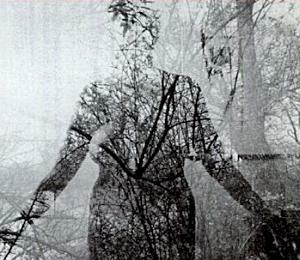
Life in the Forest
(1978)
Levertov Book Jackets
A Tree Telling of Orpheus
Denise Levertov
Conversations with Denise Levertov
edited by Jewel Spears Brooker
Google Books
Tribute: Denise Levertov
Robert Creeley
Poems by Denise Levertov
Denise Levertov: The Poetry of Engagement
Audrey T. Rodgers
Google Books _______________________
qarrtsiluni
...an experiment in online literary and artistic collaboration. The title comes from an Iñupiaq word that means "sitting together in the darkness, waiting for something to burst."
Current Issue
Journaling the Apocalypse
Editors: Beth Adams and Dave Bonta

Wilder Shores of Love
Cy Twombly
b. 1928 1 2 3 4 5 6
_______________________
On reading The Road
Raymond Federman
whatever you're doing
stop
stop right now
even if you are in the middle of a dream
go immediately buy THE ROAD by Cormac McCarthy
right now --
No book has gotten to me that much since I first read Molloy or better yet How It Is
this book shows us How it will be
No book has moved me [even when I first read Calvino] than THE ROAD since I felt the little slippage when I first read Sam
it may be because of my present condition as I confront my mortality up close
it's a sad mysterious cryptic and crystal clear
we are in the No-man's land of deviltry
there is urgency to each page
raw emotional pull
...(more)
_______________________
Between The Gulfs
Philip Lamantia
October 23, 1927-March 7, 2005
I have watched the metamorphosis of a theory of "volatile-negative-analogies" rise through a group of poems bearing the title Becoming Visible, in the sense of releasing out of darkness the words desiring movement with other words in a free interchange and development of their properties and signatures, but within a process stalked by the emotion-radiant, palpitant activity that magnetizes the illimitable resources of the arbitrary -- a risk-laden region from which the exigent action of unprecedented verbal encounters relates to the refusal of previously known paths of association. Here at the center of a void inundated by a shadow of flashing color, the necessity of the voice released by psychic automatism to find its body provokes the primal spark of dynamic movement while the great "negativistic hand" André Breton exalted as an essential lever of poetic vitality opens dialectically the window on the Heraclitian plane of "the hidden harmonies." Armed with this negative power, writing becomes a rigorous reconstruction against the past, an adamant refusal to be entangled in previously conquered areas of association. From this vista of dormant volcanos and tropical ice, we call all the more happily trace our inspirations from Lautréamont and Rimbaud to Breton and Péret and Roussel to Magliore-Saint-Aude, exemplary sign-posts for further transgressions, without literally re-tracing one's own poetic praxis their inimitable movements. The vitality of automatistic progression from this negative summit renders ineffectual the efforts of academic and literary -- commodity fetish -- assimilation of surrealism's becoming, exposing the absurd nature of conventional aesthetic criteria, that farce of the dead hand of "positive identity." The CIA of the mind shall be desiccated in its attempts to stigmatize the latent furor in the great deserts to be overturned.
A selection of miscellaneous writings
Notes toward a Rigorous Interpretation of Surrealist Occultation
Philip Lamantia
Poetry as Revolutionary Praxis:
Philip Lamantia & the Surrealist Movement in the United States
Franklin Rosemont
Six Poets at Six Gallery
It was the poetry slam to end all slams - Philip Lamantia, Michael McClure, Allen Ginsberg, Gary Snyder, Phil Whalen, Kenneth Rexroth, and Jack Kerouac.
The legendary "Six Poets at Six Gallery" reading was held on October 7, 1955
Lamantia interview
David Amram remembers Philip Lamantia, one of the four members of "The Jazz/Poetry Trio" (Lamantia, Jack Kerouac, Howard Hart and David Amram)
_______________________

Mechanics' Institute Exhibition
San Francisco, California
1876 Carleton Watkins
1829-1916
1 2 3
Dialogue among Giants:
Carleton Watkins and the Rise of Photography in California
Carleton Watkins: The Art of Perception
_______________________
Joe the Plumber and GOP 'Authenticity'
Thomas Frank
Ronald Reagan's pollster, Richard Wirthlin, as recorded in one of the main Reagan strategy documents from 1980:
"People act on the basis of their perception of reality; there is, in fact, no political reality beyond what is perceived by the voters."
The context of Wirthlin's reality-denial, according to the historian Kim Phillips-Fein, who unearths his statement in her forthcoming book, "Invisible Hands," was the larger Republican plan to woo blue-collar voters.
The mission was a success. It worked because Republicans wholeheartedly adopted Wirthlin's dictum. Reality is a terrible impediment when you're reaching out to workers while simultaneously cracking down on unions and scheming to privatize Social Security. Leave that reality to the "reality-based community," to use the put-down coined by an aide to George W. Bush.
The "perception of reality," on the other hand, is an amazing political tonic, and with it conservatives have cemented a factproof worldview of lasting power....(more)
_______________________
The next time a Conservative tries to pretend their Glorious Cause was an untrammeled Originalist paradise until George Bush tiptoed into the White House in the dead of the night and fucked it all up, stuff their mendacious giggletalk right back down their throats and remind them that "Joe" has been with us forever, and for the last 40 years their Glorious Cause has been mining him like uranium.
- driftglass
_______________________
Election Preview 2008
Pew
...a comprehensive look at the rules, technology, registration figures and issues to watch in all 50 states and the District of Columbia.
_______________________
Election Integrity:
A sampling of ongoing reports on widespread voter suppression
Guernica / Blog
_______________________
Police prepare for unrest
What kind of “Election Day unrest” are we talking about?
Teresa Nielsen Hayden
Making Light
_______________________
If Jesus Ran For President...
In some alternate universe, Jesus Christ is running for U.S. president. Here's the ad his opponent might have to run.
_______________________
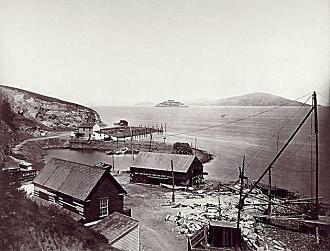
Carleton Watkins
Alcatraz
from North Point
Carleton Watkins
c. 1866
_______________________
how human nouns
Noah Eli Gordon
To Map The Wearing Away Of Things
what endows an anecdote with so much tinder
a particular tree in how light fell
how human nouns what the nucleus of commerce won’t replicate
the world in a real enough window
money made of money a bare ankle
pacing from the vault to the podium
to fasten the world a believable cape
****
The Forest Burns Into Later Time
all that I saw from the balcony
an evening’s warranted fiction yoked
little lamb that gathers & gathers against a half-eaten idea
I’m writing from the weather
inside a dictionary of difficult words
details solidify with each retelling
but someone coughs & the theater caves in
...(more)
.....................................................
Eight Experiments in Artifice
Noah Eli Gordon
Between a prayer for the telescope and a prayer for the microscope, pixels flare into a water-logged anthill, antiquating the 20th Century’s representational doubt, or doubting all representations of ownership. In the condensed book of this boy’s vigilance, the absence of a crown shows hierarchy to have no color. I prefer the muddy ghost of one sustained cello note over one hundred thousand science experiments. I prefer two electrified balloons pushing away from each other like localized points of reference.
Perhaps one can love the academic sentence for its ethical contortions, the footnote for its fishhooks pulling up islands from the ocean floor. Both captain and pilot survive consideration, as the barge destroys the view from the bridge and the nomenclature of clouds gives the day another creation myth to ignore. ...(more)
_______________________

Diálogo: Óculos
1968
Lygia Clark
October 23, 1920 - April 25, 1988
Lygia Clark and Hélio Oiticica:
A Legacy of Interactivity and Participation for a Telematic Future
Simone Osthoff The Body’s Contagious Memory
Lygia Clark’s Return to the Museum
Suely Rolnik
Translated by Rodrigo Nunes
Lygia Clark: in search of the body
Guy Brett
Art in America, July, 1994
Lygia Clark
Vivian Rehberg
_______________________
A Clearing
poem by Forrest Gander
photographs by Ray Meeks
Almost Island
_______________________
Impossible Life
Linh Dinh
If This is a Man
You who live safe
In your warm houses,
You who find, returning in the evening,
Hot food and friendly faces:
Consider if this is a man
Who works in the mud
Who does not know peace
Who fights for a scrap of bread
Who dies because of a yes or a no.
Consider if this is a woman,
Without hair and without name
With no more strength to remember,
Her eyes empty and her womb cold
Like a frog in winter.
Meditate that this came about:
I commend these words to you.
Carve them in your hearts
At home, in the street,
Going to bed, rising;
Repeat them to your children,
Or may your house fall apart,
May illness impede you,
May your children turn their faces from you.
--from Primo Levi’s preface to his Holocaust memoir, translated from the Italian by Stuart Woolf
(....)
From every fresh or foul mouth, an invitation, every dusky door, lolling, expectant figures on some funky couch. Fingers beckon. I see bright teeth. In this come-on universe, it takes strength or satiety to just say no and turn away, but many have never been invited to the gorge now, pay-later-with-interest bash. Worldwide, a billion people live in slum conditions. In 2005, the wealthiest 20% accounted for 76.6% of private consumption. The poorest fifth, 1.5%. Ten million starve to death each year, thirty thousand a day. Enough already, stop getting so righteous. Who do you like in the World Series? I say Phillies in six games. They’re hungrier.
No protest is as desperate as a hunger strike. An incremental and invisible suicide, it lacks the drama of self-immolation. No one sees or cares. Often, there’s no conscience to appeal to....(more)
_______________________
Language doubled
Spurious
Language doubled, language that no longer disappears into mediation: how does it call you, how does it come to claim you? When the right word does not come, perhaps: when the word that would allow you to speak eludes you and, in its absence, seems to unjoin your capacity to speak from itself. When you stammer, and language seems to stammer, according to a rhythm that interrupts the rhythm of speech. Or is it arrhythmical, the voice that joins yours? Stuttering, hesitancy - distrust the ability to speak. Speak by way of blocks and breaks. Then what you cannot say joins what you say. Speak, and it is not only you that is speaking.(....)
And then there is the speech of the infatuated - errant, wandering because it cannot yet pose what is obvious: the fact of attraction. Speech wanders from what both parties would want it to say. Wandering speech, that speaks by way of what cannot be said. Think of the dialogues of Henry James.
And still another kind of speech - the one that accompanies images, but seems to have little to do with what is presented. That belongs to itself, that clears a space for itself, letting those images become more dense and more strange. The poems of Tarkovsky's father in Mirror. The dialogue in Godard's In Praise of Love. What are they saying? What is going on? And the image of the Seine, the bridges: what does it mean? Errant speech, again. Wandering speech, once again. (....)
Or the choked blog, like a dawn marsh with steaming fog. A blog running nowhere, standing water, stagnant water. Or that is like rusted metal, turned all colours. Or the objects from Stalker's nightstand underwater. An encrusted hull in drydock. A throat filled with mucus....(more)
_______________________
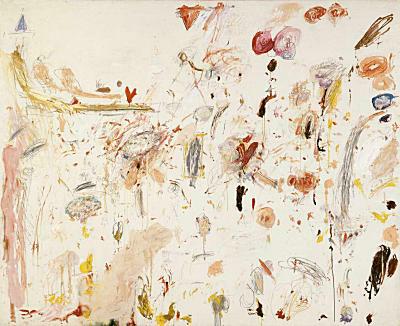
Roma
Cy Twombly
_______________________
from All Electrons Are (Not) Alike
Rosmarie Waldrop
conjunctions
A view of the sea is the beginning of the journey. An image of Columbus, starting out from the abyss, enters the left hemisphere. Profusion of languages out of the blue. Bluster, blur, blubber. My father was troubled by inklings of Babel and multiplication on his table. Afraid that an overload of simultaneous neural firings would result in an epileptic convulsion. The explorers’ attention, like the foot of a snail, held on to the planks of their vessels, not communicating. Too intent on the physical fact, waves, whales, or poison arrows. Later, though, poured forth stories never dreamed of by the natives. As if languages were kidnapped as easily as green shady land profuse of flowers.(....)
Merchants of language travel with paper currency. Columbus’s fleet had no priest, but had a recorder. Transactions with eternity less pressing than “legality” secured by writing. The power to name. When I was ten I read Westerns by Karl May and with him crossed the border between Mexico and Canada. Columbus erased heathen names like Guanahaní. Christened the islands to become king of the promised land. As Adam, who “called the animals by their true names,” was thereby to command them. San Salvador. Salvation, salve, salvage, salvo. The power to name is power. Especially when backed by guns....(more)
_______________________
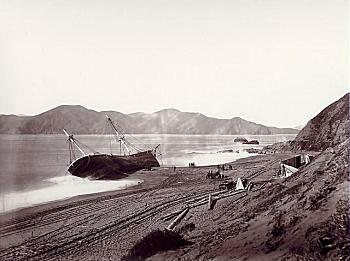
The Wreck of the Viscata
Carleton Watkins
1868

Canyon
Robert Rauschenberg
1959
_______________________
Planet Eaters
Andrew Glikson and Emily Spence
The history of Earth includes five major mass extinctions which define the ends of several periods, including the Ordovician, Devonian, Permian, Jurassic and Cretaceous periods. Each of these events has been triggered by extraterrestrial impacts, massive volcanic eruptions, or methane release and related greenhouse events. Yet, with the exception of the role of methanogenic bacteria in relation to methane eruptions in the past, the Sixth mass extinction is a novelty: For the first time in its history, the biosphere is in crisis through biological forcing by an advanced form of life, namely the activity of a technological carbon-emitting species.
Humans live in a realm of perceptions, dreams, myths and legends, in denial of critical facts (Janus: A summing up, Arthur Koestler, 1978). They wake up for a brief moment from an infinite universal slumber to witness a world as cruel as it is beautiful, a biosphere dominated by the food chain. An inverse relation may exist between the level of consciousness achieved by a species and its longevity, once it creates machines and processes that it can not control. If looking into the sun may result in blindness, so, according to as yet little-understood laws of entropy, the deep insights into nature that humans have achieved may bear a terrible price.
Existentialist philosophy allows a perspective into, and a way of coping with, all that defies rational contemplation. Ethical and cultural assumptions of free will rarely govern the behavior of societies or nations, let alone an entire species.
And although the planet may not shed a tear for the demise of technological civilization, hope, on the individual scale, is still possible in the sense of existentialist philosophy. Going through their black night of the soul, members of the species may be rewarded by the emergence of a conscious dignity devoid of illusions, grateful for the glimpse at the universe for which humans are privileged by the fleeting moment:
“Having pushed a boulder up the mountain all day, turning toward the setting sun, we must consider Sisyphus happy.” (Albert Camus, The Myth of Sisyphus, 1942)
...(more)
_______________________
Alexandria; 64 A.D.
Jorge Luis Borges
Translated by Stephen Kessler
Tuesday Poem
By Jim Culleny
Unceasing human work gave birth to this
Infinity of books. If of them all
Not even one remained, man would again
Beget each page and every line,
Each work and every love of Hercules,
And every teaching of every manuscript.
In the first century of the Muslim era,
I, that Omar who subdued the Persians
and who imposes Islam on the Earth,
Order my soldiers to destroy
By fire the abundant Library,
Which will not perish. All praise is due
To God who never sleeps and to Muhammad,
His Apostle.
...(more)
_______________________
Critical Studies in Improvisation
Vol 4, No 1 (2008)
From the Margins to the Mainstream:
Jazz, Social Relations, and Discourses of Value
Alan Stanbridge
Open Journal Systems
...a journal management and publishing system that has been developed by the Public Knowledge Project through its federally funded efforts to expand and improve access to research.
A Sample of Journals Using Open Journal Systems
(free registration is requited by some - mw)
_______________________
 Tlazolteotl
1930s
Man Ray's Lost and Found Photographs: Arts of the Americas in Context
Wendy Grossman
Abstract
Man Ray’s virtually unknown photographs of a much celebrated Aztec birthing figure commonly identified as Tlazolteotl—the goddess of earth, sex, and childbirth in Aztec mythology—provide the springboard for exploring a body of little known photographs of non-Western objects the artist created in Paris in the 1920s and ‘30s. Integrating his images of objects from indigenous peoples of the “New World” into his photographic repertoire of other non-Western objects, this article reveals the context and manner in which art of the Americas became a vehicle for his creative expression alongside objects from Africa and Oceania. Turning his camera lens to such objects, Man Ray produced images that—through a symbiotic relationship of content and form— imbued the objects with the same modernist aesthetic he pioneered in his photographs. In so doing, he created a new type of photography that defies categorization and functions ambiguously in the gap between the ethnographic and the surreal. This body of images provides both a window into the way in which such cultural artifacts became enmeshed in transatlantic artistic practices of the interwar period and insight into the role of his photographic endeavors in that process. The recovery of Man Ray’s photographs of the “Tlazolteotl” figure from obscurity and the examination of his engagement with the indigenous arts of the Americas allow new assessment of the work of this artist and contribute to a comprehensive understanding of his innovative approach to photographing objects of non-Western art.
Journal of Surrealism and the Americas
Vol 2, No 1 (2008)
Special Issue on Surrealism and Ethnography_______________________

Let's Get Lost
William Claxton
(October 12, 1927 - October 11, 2008)
1 2
William Claxton: Photographic Memory
Garrett White
Jazz for the eyes
Geoff Dyer on William Claxton
_______________________
notes(Kristeva--->Artaud
Madame Lévy
La Vache Qui Lit
Yes. I think that in my process Artaud doesn't have all that much to do with linguistics. He has to do with - the place of madness (where you place - the placement of - fou-ness) in the contemporary world.
more
_______________________
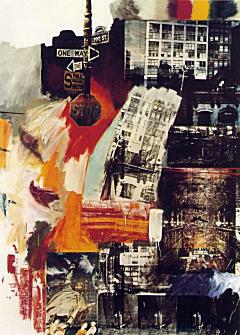
Estate
1963
Robert Rauschenberg
October 22, 1925 – May 12, 2008
_______________________
Diminishing Returns
Noah Eli Gordon
jacket
A Leap from the Atmosphere of Scholarship
Projected on the wall, an essentialist's idiot order becomes the wall,
becoming itself a projector through which one might animate a door
swinging between open & concealed eroticism. At seventeen, Schubert
gives Gretchen her grave. At thirty, who isn't a melancholy antihero
haunting French literature? Pitched one octave below the oboe, pinned
to transparent paper, sentimental as an anecdote driven toward self-deification,
the empire of systemically expressed thought dusts its lilies. I'm convinced
that covering a chameleon in ink would cancel natural phenomena.
Turning the conviction timeless, unmoving and immutable, an arrow passes
our illusion - a long exile from one's own blackened sheep. The worm
at home in its blindness. The inelastic world latched up. Modern evolutionary
scientists no longer search for the missing link. Nevertheless, it does move.
...(more)
_______________________
Abstracting Photography
Walead Beshty
Words Without Pictures
The issue of what constitutes “Photography” as an ontological category has again gained currency. A reaction to the often-cited sense that somehow the term, and the practices it describes, have lost their historical and theoretical footing, now representing an amorphous field of loosely connected practices. The charged debates of the late seventies and eighties between the staid Photography department of The Museum of Modern Art, and “postmodernist” critics who attempted to dislodge its monopoly on photographic history had given Photography a position of importance, an energy that has, by this time, all but petered out. Between the loss of photography’s status as an urgent intellectual battleground, and its denaturalization by a series of technological developments, an impenetrable fuzziness has descended over what Photography—as an aesthetic and theoretical discourse—actually is, and what might be at stake in reopening this discussion of Photography’s identity. In the wake of what are now decades old polemics, bits, pieces, and fragments of previous formulations, and aesthetic conventions litter Photography’s theoretical landscape. As George Baker wrote in his essay “Photography’s Expanded Field”, “Critical consensus would have it that the problem today is not that just about anything image-based can now be called photographic, but rather that photography itself has been foreclosed, cashiered, abandoned—outmoded technologically and displaced aesthetically.” In other words, the Barthesian theorization of the “this has been” contained in the photographic image, has become the “this has been” of Photography itself. ...(more)via The Exposure Project
_______________________
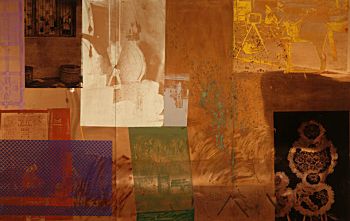 Robert Rauschenberg
_______________________
John Ralston Saul: A Fair Truth
a review of Saul's A Fair Country: Telling Truths About Canada
rob mclennan
As Saul talks about how English and French literatures are separately taught in universities, as though they haven’t ever influenced each other, how can we conceive of native influence, if we can’t even acknowledge the cross-influences between our other two founding languages?
But there is almost no formal discussion of the implication of such influence. Our universities—anglophone and francophone—are largely constructed as pale imitations of European models led by language. And so ideas—to say nothing of literature and history—are separated out by language, as if that were the ultimate statement of meaning, as if an Algerian novel had more to say to a francophone or a Sri Lankan novel had more to say to an Anglophone just because it was written in their language, even if the experiences and influences are completely different. […] If we have difficulty accepting the profound meaning of this English-French crossover, it is even less surprising that we don’t deal with the Aboriginal influence on both. And yet, if we accept the idea that our civilization has been built upon three pillars and so has a triangular foundation, that must mean something. And the central meaning must be the effect on our thinking.
Saul doesn’t just rely on history, but brings it up to the skirmishes and foolishnesses of today, reminding non-aboriginals that every blocked highway, even in the words of those doing such, have been a last resort, after conversation fails, and is seen as a failure on the part of those blocking. This is an important and even essential book, and he has easily convinced me of Canada being a Metis nation (but where do we go now, becomes the next question). Anyone interested in history, where we are now and where we must go, has to read this book....(more)
_______________________
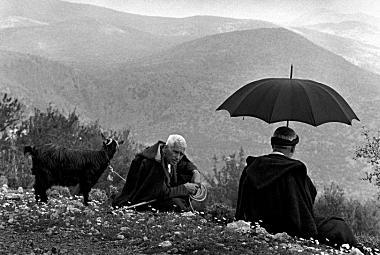
Constantine Manos
_______________________
the executioner's melancholy
Roger Gathman
limited inc
“… writing, on the contrary, is always rooted in a beyond of language, it develops like a seed and not like a line, it manifests an essence and threatens with a secret, it is a counter-communication, it intimidates. We will find in all writing the ambiguity of an object which is at the same time language and coercitation: there is, at the bottom of writing, a “circumstance” that is foreign to language, there is something like the glance of an intention that is already no longer that of langauge. This glance can very well be a passion for language, as in literary writing; it can also be the threat of a penality, as in political writing: writing is then charged to join in a single dash the reality of acts and the ideality of ends.” – Barthes, The Degree Zero of Writing
(....)
Barthes was concerned with another system – the system of ecriture. This has a lot more relevance to Chamfort. Chamfort wrote his “Products” out of a reaction to, a consciousness of, the writerly function. That function – which, as with all middleman positions, has an unearthly relation to the basic one of pandering – is both under attack in the Maxims – from the beginning, the very idea of the maxim is ridiculed as the idea of a mediocre mind – and, inevitably, chosen as Chamfort’s instrument.(....)
The executioner’s melancholy arises from the perception that the rupture between the regimes of compensation has corrupted us in such a way that there is no going back. It is an irrevocable movement.
“Society is not, as is commonly believed, the development of nature, but rather its decomposition and entire remaking. It is a second edifice, built with the ruins of the first. We rediscover the debris with a pleasure mixed with surprise. It is this which occasions the naïve expression of a natural sentiment which escapes in society. It even happens that it pleases more, if the person from whom it escapes is a rank more elevated, that is to say, farther from nature. It charms in a king, because a king is in the opposed extremity. It is a fragment of ancient doric or corinthian architecture in a crude and modern edifice.”
more on Nicolas Chamfort (1741 - 1794)

Egon Schiele
1890-1918
_______________________
Post Mortem for Milton Friedman
Robert Pollin
We are in the midst of a major historic turning point, equivalent to the emergence of neoliberalism under Thatcher and Reagan.
_______________________
The U.S. Imperial Triangle and Military Spending
John Bellamy Foster, Hannah Holleman, and Robert W. McChesney
monthly review
The United States is unique today among major states in the degree of its reliance on military spending, and its determination to stand astride the world, militarily as well as economically. No other country in the post–Second World War world has been so globally destructive or inflicted so many war fatalities.(....)
If absorption of the massive economic surplus of large corporate capital through increased government spending was the key to accumulation in post–Second World War U.S. capitalism, this was dependent principally on military expenditures, or what Kalecki in 1956 labeled “the armament-imperialist complex.” This resulted in a “high degree of utilization” of productive capacity and “counteracted the disrupting influence of the increase in the relative share of accumulation of big business in the national product.”(....) There is no doubt that a society that supports its global position and social order through $1 trillion a year in military spending, most likely far exceeding that of all the other countries in the world put together, unleashing untold destruction on the world, while faced with intractable problems of inequality, economic stagnation, financial crisis, poverty, waste, and environmental decline at home, is a society that is ripe for change. ...(more)
_______________________
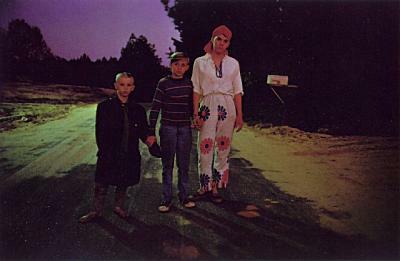
Halloween
Mississippi
1971
William Eggleston 1 2 3 4 5 6
The Condition of Music
William Eggleston interview
Frieze Magazine
_______________________
A Legacy of Resentment
Are McCain and Palin Wallace's heirs?
Diane McWhorter
"So how is Sarah Palin like-and not like-George Wallace? And how much is John McCain relying on tactics Wallace used? The answers: more than she can probably know and more than he appears to have admitted to himself."
_______________________
Voter Purges
Brennan Center for Justice
New York University School of Law
a major research project
via David Neiwert _______________________
The ekonomics of Fantasyland
Jim Chaffee
...humans are not much changed since Neolithic times except they have developed fancier ways of expressing their fundamentally superstitious views of the world.(....)In reality the US is not now a capitalist nation, at least not in the classical sense of the word capitalism. Since the time of Reagan (and perhaps nascent since WWII), the US has become a military-socialist nation, or as some call it to point out how this variant of socialism is mechanized, a military-Keynesian nation....(more)
_______________________
Money, Media & the Mess in America
Robert Parry
Consortiumnews
January 28, 2005
Sometime after 2009, when historians pick through the wreckage left behind by George W. Bush’s administration, they will have to come to grips with the role played by the professional conservative media infrastructure.
_______________________
The Candidates: They're Ambivalent and They Can't Help It. No One Can
John P. Briggs and J.P. Briggs
Contrary to popular belief, ambivalence - the feeling of being torn between opposing paths - lies at the heart of any "real" decision. We all experience ambivalence. In fact, it's pervasive throughout our individual lives: from vacillating between alternatives of what shirt to wear, what food to eat on the menu, what mutual fund not to invest in, to deeper issues: How do I handle my rebellious child? Am I choosing the right path for my future? If a decision is cut and dried, there is in fact no decision to make. The course is simply obvious. But all of our real decisions - small and large - have some degree of ambivalence and uncertainty attached to them.
For the past eight years, American voters afforded themselves the rare opportunity to observe a president who claims to be immune from any ambivalent feelings in making the kinds of decisions that would give any other leader pause: sending troops to engage in an elective war in Iraq, torturing human beings, saving the planet from climate change, saving the financial system. He has sold himself as a great leader on the basis of his self-confident certainty, and for a long time the public bought it. From a psychological perspective, Bush's repeated assertions that he never experiences doubt in critical matters are simply not credible. They're a dangerous fantasy.
How do the two men seeking to replace George W. Bush engage the ambivalence of the decision-making process? ...(more)
_______________________
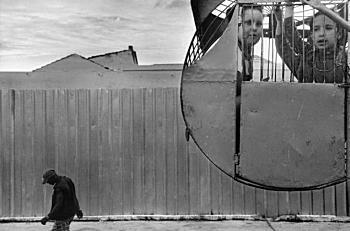
Zoltán Vancsó
_______________________
A Left-Handed Commencement Address
Ursula K. Le Guin
b. October 21, 1929
Success is somebody else's failure. Success is the American Dream we can keep dreaming because most people in most places, including thirty million of ourselves, live wide awake in the terrible reality of poverty. No, I do not wish you success. I don't even want to talk about it. I want to talk about failure.
Because you are human beings you are going to meet failure. You are going to meet disappointment, injustice, betrayal, and irreparable loss. You will find you're weak where you thought yourself strong. You'll work for possessions and then find they possess you. You will find yourself - as I know you already have - in dark places, alone, and afraid.
What I hope for you, for all my sisters and daughters, brothers and sons, is that you will be able to live there, in the dark place. To live in the place that our rationalizing culture of success denies, calling it a place of exile, uninhabitable, foreign.(...)
Why did we look up for blessing - instead of around, and down? What hope we have lies there. Not in the sky full of orbiting spy-eyes and weaponry, but in the earth we have looked down upon. Not from above, but from below. Not in the light that blinds, but in the dark that nourishes, where human beings grow human souls....(more)
_______________________
Fallible Man
Paul Ricoeur
Revised translation by Charles A. Kelbley
mediafire pdf
via Continental Philosophy
...even if evil were coeval with the root origin of things, it would still be true that it is manifest only in the way it affects human existence. Thus, the decision to enter into the problem of evil by the strait gate of human reality only expresses the choice of a center of perspective: even if evil came to man from another source which contaminates him, this other source would still be accessible to us only through its relation to us, only through the state of temptation, aberration, or blindness whereby we would be affected. In all hypotheses, evil manifests itself in man's humanity.
It may be objected that the choice of this perspective is arbitrary, that it is, in the strong sense of the word, a prejudgment; such is not the case. The decision to approach evil through man and his freedom is not an arbitrary choice but suitable to the very nature of the problem. For in point of fact, evil's place of manifestation is apparent only if it is recognized, and it is recognized only if it is taken up by deliberate choice. The decision to understand evil by freedom is itself an undertaking of freedom that takes evil upon itself. The choice of the center of perspective is already the declaration of a freedom that admits its responsibility, vows to look upon evil as evil committed, and avows its responsibility to see that it is not committed. It is this avowal that links evil to man, not merely as its place of manifestation, but as its author. This act of taking-upon-oneself creates the problem; it is not a conclusion but a starting point. Even if freedom should be the author of evil without being the root origin of it, the avowal would place the problem of evil in the sphere of freedom. For if man were responsible for evil only through abandon, only through a kind of reverse participation10 in a more radical source of evil than his freedom, it would still be the avowal of his responsibility that would permit him to be in contact with that root origin. _______________________
Desperately Seeking Wittgenstein
John Gunnell
abstract:
It has been notoriously difficult to link Ludwig Wittgenstein’s work to
the agendas of academic political theory. While this is in part due to his style of
writing and the absence of an explicit discussion of politics, his commitment to the
irreducibility of conventions is difficult to reconcile with the search of many political
theorists for both criteria of political essentiality and a basis of cognitive privilege that
would underwrite a vision of critical and normative inquiry. Although political theory
is characteristically drawn toward the literature of philosophy in search of identity and
images of epistemic authority, Wittgenstein’s work subverts the search for the
universality of both politics and political inquiry. It is, however, possible to perceive
in his work a positive valence for both a vision of political inquiry and criteria of
democracy. mediafire pdf
_______________________

Egon Schiele
_______________________
Frost at Midnight
Samuel Taylor Coleridge
(21 October 1772 - 25 July 1834)
The Frost performs its secret ministry,
Unhelped by any wind. The owlet's cry
Came loud--and hark, again ! loud as before.
The inmates of my cottage, all at rest,
Have left me to that solitude, which suits
Abstruser musings : save that at my side
My cradled infant slumbers peacefully.
'Tis calm indeed ! so calm, that it disturbs
And vexes meditation with its strange
And extreme silentness. Sea, hill, and wood,
This populous village ! Sea, and hill, and wood,
With all the numberless goings-on of life,
Inaudible as dreams ! the thin blue flame
Lies on my low-burnt fire, and quivers not ;
Only that film, which fluttered on the grate,
Still flutters there, the sole unquiet thing.
Methinks, its motion in this hush of nature
Gives it dim sympathies with me who live,
Making it a companionable form,
Whose puny flaps and freaks the idling Spirit
By its own moods interprets, every where
Echo or mirror seeking of itself,
And makes a toy of Thought.
...(more)
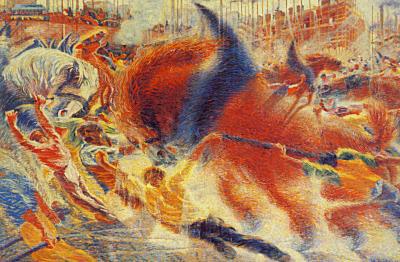
The City Rises
Umberto Boccioni
b. Oct 19, 1882
_______________________
Of Which Real is this Crisis the Spectacle?
Alain Badiou
Le Monde, 17/10/08
translated by infinite thØught and ICJ
We must overthrow the old verdict according to which ours would be the time of "the end of ideologies". Today we can clearly see that the only reality of this supposed end lies in the slogan "save the banks". Nothing is more important than recovering the passion of ideas and countering the world such as it is with a general hypothesis, the anticipated certainty of an entirely different state of affairs. To the nefarious spectacle of capitalism, we oppose the real of peoples, of the existence of all in the proper movement of ideas. The theme of an emancipation of humanity has lost none of its power. Undoubtedly, the word "communism", which for a long time served to name this power, has been debased and prostituted.
But today, its disappearance only benefits the advocates of order, the feverish actors of the disaster movie. But we will resuscitate communism, in its new-found clarity. This clarity is also its oldest virtue, as when Marx said of communism that it "breaks in the most radical fashion with traditional ideas" and that it will bring forth "an association in which the free development of each is the precondition for the free development of all".
Total break with capitalist-parliamentarianism, the invention of a politics on a level with the popular real, sovereignty of the idea: it's all there, everything we need to turn away from the film of the crisis and to give ourselves over to the fusion between live thought and organised action....(more)
_______________________
A crisis for the centre of the system
Andrew Kliman
A comment from Andrew Kliman
As for the longer-term conditions that have given rise to the crisis, my view is basically this: The world economy has never fully recovered from the crisis of the 1970s – not in the way in which the destruction of capital in and through the Great Depression and WWII led to a post-war boom. That’s largely because of an understandable fear of having a repeat of the Great Depression. So there’s been a partial recovery only, brought about largely through:
(1) declining real wages for most workers and other austerity measures, as well as exporting the crisis into the 3d world, and
(2) a mountain of debt – mortgage, consumer, government, corporate – to paper over the sluggishness and mitigate the effects of the declining real wages.
Thus there have been persistent debt crises, and these will continue until:
(a) sufficient capital is destroyed (in value terms and physically) to once again make investment truly profitable – the present crisis may well end up being this moment, or
(b) there’s such a panic (“liquidity lock,” as a Fed official recently called it) that lending stops and the economy crashes, ushering in chaos or fascism or warlordism or whatever, or
(c) capitalism is replaced by a new human, socialist society.
Bubbles are thus, according to the above, an inevitable result of efforts to “grow the economy” faster than is warranted by the underlying flow of new value generated in production. The more sophisticated and widespread the credit markets, the greater is the degree to which “forced expansion” (Marx) can take place, but also the greater the degree of ultimate contraction when the law of value eventually makes its presence felt. It’s like a rubber band stretching and snapping back....(more)
Marx and the financial crisis of 2008
There are a plenty of left-wing websites that talk in generic terms about the 'anarchic nature of capitalism', the 'growth of financial parasitism', or the 'decay of American capitalism', but these phrases by themselves do not explain anything. Nor does referring to the 'tendency of the rate of profit to fall' unless it can be shown how this tendency gives rise to credit bubbles. Here we aim to collect material that tries seriously to link an explanation of the present credit bubble and its implosion to Marx's basic account of the capitalist economy.
-
Andrew Chitty
_______________________
Capitalist Crisis, Marx's Shadow
by Rick Wolff
Radical Perspectives on the Crisis
Financial Crisis News _______________________
Anti-democratic nature of US capitalism is being exposed
Noam Chomsky
The Irish Times
via mirabile dictu
_______________________
The Old Guard on the New Crisis, pt. 2
Mario Tronti, Politics at Work
translated at the Institute for Conjunctural Research
_______________________
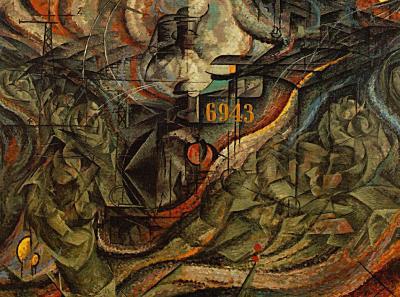
States of Mind; The Farewells
Umberto Boccioni
_______________________
White Pride, Campaign Wide
Passionately Credulous Bigots for McCain.
Gen. JC Christian, Patriot
_______________________
Palin and God's Children
God Bless the U.S.A.!
Missy Comley Beattie
_______________________
Let's review: Barack Obama served on a school reform board funded by an ally of Ronald Reagan, along with a number of Democrats, Republicans, and Independents. John McCain accepts money and enjoys sitting down for interviews with a man who is a convicted felon, who plotted murders and bombings, who advocated killing federal agents, who named his shooting targets after a President and First Lady/Senator, and who tingled when he listened to Adolph Hitler speak. And John McCain praises his:
...adherence to the principles and philosophies that keep our nation great.
Exactly which candidate "is not a man who sees America as you see America and as I see America"?
- BarbinMD (Kos)
_______________________
Media Matters: Loose ends
Jamison Foser
The lack of media attention to the Liddy-McCain relationship is one of the clearest double standards in recent political history. McCain and the news media have devoted an extraordinary amount of attention to Barack Obama's ties to Bill Ayers, yet until last night, McCain hadn't been asked a single question* about his ties to Liddy, a convicted felon who has instructed his listeners on how best to shoot law-enforcement agents. Liddy has held a fundraiser for McCain at his home and describes the Arizona senator as an "old friend"; McCain has said he is "proud" of Liddy.
Imagine for a moment that Barack Obama had said he was "proud" of an "old friend" who urged people to shoot law-enforcement agents in the head. Do you think maybe he would have been asked a question or three about it? Do you think maybe there would have been more than the occasional passing mention in the news of the relationship? Of course there would have been.
Unfortunately, after Letterman broke the media's embargo on questioning McCain's relationship with Liddy, reporters quickly pretended it never happened......(more)
_______________________
Intellectual Cleansing - Parts 1, 2 and 3
Media Lens
_______________________
Women for McCain
"In case McCain's "the health of a mother" quote on quote reference didn't convince you that he is really... strong on women's issues, maybe this video will!
See why women TOTALLY support McCain and Palin! It's literally a no-brainer."
_______________________
It's Already Stolen
Investigation by Robert F. Kennedy Jr. and Greg Palast released today
Don’t worry about Mickey Mouse or ACORN stealing the election. According to an investigative report out today in Rolling Stone magazine, Robert F. Kennedy Jr. and Greg Palast, after a year-long investigation, reveal a systematic program of "GOP vote tampering" on a massive scale.
- Republican Secretaries of State of swing-state Colorado have quietly purged one in six names from their voter rolls.
Over several months, the GOP politicos in Colorado stonewalled every attempt by Rolling Stone to get an answer to the massive purge - ten times the average state's rate of removal.
- While Obama dreams of riding to the White House on a wave of new voters, more then 2.7 million have had their registrations REJECTED under new procedures signed into law by George Bush.
Kennedy, a voting rights lawyer, charges this is a resurgence of 'Jim Crow' tactics to wrongly block Black and Hispanic voters.
- A fired US prosecutor levels new charges - accusing leaders of his own party, Republicans, with criminal acts in an attempt to block legal voters as "fraudulent."
- Digging through government records, the Kennedy-Palast team discovered that, in 2004, a GOP scheme called "caging” ultimately took away the rights of 1.1 million voters. The Rolling Stone duo predict that, this November 4, it will be far worse....(more)
Steal Back Your Vote!
_______________________

photo - mw
_______________________
from
Rainstorm: Late Autumn
Joseph Duemer
Rain beats the last leaves from the trees.
I remember the shape of my friend's
breath. The clouds break open briefly.
In those days we were silly enough.
Lighting up the river's steely surface.
To walk all night talking about art.
So that I remember the white roses.
And literature's relation to the world.
Glowing beneath a streetlight there.
The sky closes up again—a curtain
of rain sweeps over. In that lost world.
The surface. We could not help believing.
There is a long scar of light on the water.
That we would live forever.
...(more)
in Annie Ballerdini's autumnal fieralingue
Joseph blogs at Sharp Sand
_______________________

photo - mw
_______________________
Bruce Cockburn: An Appreciation
Shaun Mullen

Ando Hiroshige
_______________________
Guilty Pleasures and Publishing, Part I:
Stacy Oborn
on Nazraeli Press, Asako Narahashi, Ando Hiroshige (and tea)
the space in between
And so what constitutes a guilty pleasure?
Any definition would of course be entirely subjective. I don’t know if other people have thought much about it, or share any of the same qualifications for it that I do. For one, a guilty pleasure is first and foremost Pleasurable. Even thinking about what the guilty pleasure is can be enough to begin a totally solipsistic reverie about what one loves about it, what else there is to know and discover, and what one wants from it next. And the guilty part? This may sound strange and contrary to language and definition, but for me the guilt comes from the fact that there is no guilt. I feel no guilt whatsoever in the (sometimes copious) amounts of time that I spend researching a tea vendor, poring through oolong varietal descriptions, scrutinizing the quality of the tealeaves shown in the online sample, or the community boards I’ve found that discuss high quality pu-erh teas at length (yes, they really do exist). Similarily, there is almost a joy handing over my money to the cashier at an art or gallery museum’s bookstore, or clicking “Submit” on any of the online publishing sites that I count myself a happy consumer. Maybe then what I’m describing is a kind of meta-guilt, one removed of the sting and pangs of conscience because it has to do with the largely cerebral conception of a guilt arrived at for not Really feeling guilty about the useless, unproductive pleasure in the first place.
I’ve been thinking about art publications lately, and art presses, publishing houses, the things that get made in them and the kinds of aesthetics and philosophies that get bundled between the pages and pushed along with the publication itself....(more)
_______________________
 Mikhail Vasil'evich Nesterov
d. Oct. 18, 1942
_______________________
"In the forest of estrangement"
Sometimes in that forest, where from afar I see and feel myself, a light breeze spreads a mist, and that mist is the dark, clear vision of the alcove where I exist in reality, among these hazy pieces of furniture and drapes and nocturnal torpor. Then the breeze subsides and the landscape of that other world returns to being completely and exclusively itself... At other times this small room is but an ashen whiff of fog on the horizon of that so different land.... And there are times when this tangible alcove is the ground we tread in that other land....(...)
The static motion of the trees; the troubled quiet of the fountains; the indefinable breathing of the saps; deep pulsing; the slow arrival of dusk, which seems not to fall over things but to come from inside them and to reach its spiritually kindred hand up to that distant sorrow (so close to our soul) of the heavens' lofty silence; the steady and futile falling of leaves, drops of estrangement in which the landscape comes to exist only in our hearing, and it becomes sad in us like a remembered homeland - all of this girded us uncertainly, like a belt coming undone.(...)
None of our yearnings has any reason to exist. Our attentive gaze is an absurdity allowed by our winged inertia.
- Fernando Pessoa,The Book of Disquiet, translated by Richard Zenith
_______________________
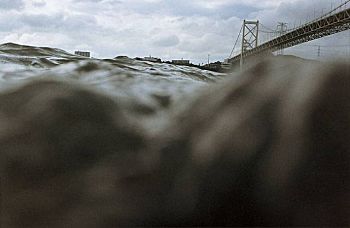
Asako Narahashi
half awake and half asleep
in the water
_______________________
Undisciplined Reading
Finding surprise in how we read
Matthew P. Brown
Let's begin by assessing that literary form most associated with the unknown, the undiscovered, or the novel—that is, the novel. Then we'll turn to early modern disciplines, finding analogies in them for contemporary reading scenes. Our guide here will be that Other to the twenty-first-century secular intellectual: the seventeenth-century English devout, those bigoted regicides and colonial Malvolios known—not without controversy, now and then, now perhaps more than then—as "Puritans."
Consider the novel. It is here that readers imagine the unimagined. An author invents a fictional world, and in this invention a different contract obtains between reader and text. Unlike the expectation of nonfiction—that it is tethered to reality, to history's determinants—readers enter the novel as a zone unburdened by the documentary, as a product of artifice and design, a place of play and fate. In this imaginative escape, authors plot events that move readers relentlessly forward, seeking answers to the mysteries established, gratifications for the desires incited. No recent thinker has better captured the pleasures of novel reading than Sven Birkerts in his collection The Gutenberg Elegies. Plenty of digerati have lambasted these beautiful essays, but Birkerts finds language for the consciousness we inhabit when being "lost in a book." For Birkerts, the novel provides a deep time unavailable to us in our moment-to-moment existence. In the novel, plotting, detail, character, and closure create an inevitable destiny, a fatedness missing from daily life. We are attracted to the novel for its linear design, a particular kind of escape that, with the godly language of "authorial design" and "fated destiny," broaches the sacred.
The experiential world of novel reading Birkerts recreates is itself built on religious connotations. When an "author's language [is] resonating in the self," the self becomes "the soul" and the immersive, deep-time consciousness prompted by novel reading is patently meditative. Whether through Muslim tawil, Zen koan, or Christian closet, meditation requires training, a point Birkerts allows is true of the reading practice he describes as well. You don't need The Gutenberg Elegies to understand that sustained attention to linear fiction requires discipline—try teaching long novels to undergrads these days. Page-turning absorption, so reverently evoked here as a trance world, is hardly a natural way to read.
As cultivated by the nineteenth-century novel, cover-to-cover escapism of this sort is an anomaly in the long history of reading....(more)

David Gagnebin-de Bons
via Mrs. Deane
_______________________
The Bilingualist
Raymond Federman
To answer the question I'm always asked.
No I do not feel that there is a space
between the two tongues that talk in me.
On the contrary. For me the one and the other
seem to overlap. To want to merge.
To want to come together.
To want to embrace one another.
Mesh one into the other.
Or if you prefer.
They want to spoil
and corrupt each other.
...(more)

Federman@80: A Celebration
Sat., Oct. 18 - Buffalo
Some Answers for Raymond Federman
Charles Bernstein Raymond Federman at EPC
Federman's Blog
Road
Raymond Federman
And if I told my story to myself ?
It is true that along the rocky story
I often stumbled, and when I fell
I would get up saying to myself
that no one had seen me, and I
would continue saying to myself,
it was an accident, and I set out
again, hobbling along, saying,
it's okay, the fall was not a fall,
the rocks were not rocks, and even
if some bystanders laughed at me,
others encouraged me, saying that
I had a beautiful story in me, and
that I had to tell it, even if to myself.
_______________________
The Lunatics The Inmates
Thomas Bernhard
translated by James Reidel
conjunctions
The state's almighty, while you're bitter and weak.
Power and the uniform are one in the same.
You keep your mouth shut, your head in check,
you walk through the wood no one cuts for us.
What such a truncheon on the head ruins
I know already, it breaks my eardrums.
I'm outfitted by the most sub-moron
and driven mad with sweat, ransacked, and shorn.
These pants rub me raw and the backsides paint
The heads of misery on the thick wall.
Some get to drink and some have to pay.
And the thing that you are drips in your hand.
(....)
The line is broken from all lines, which proves that there
exists no
line, and which also proves that one can regard everything
as the line,
presupposing a character that gets too involved in what
inevitably
drives it into ruin.
...(more)
the original - Die Irren Die Häftlinge
_______________________
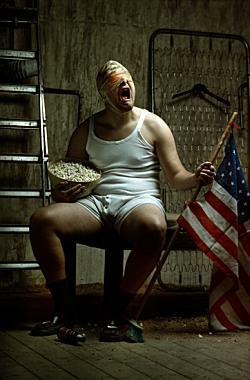
Propoganda
Eolo Perfido via r o o
_______________________
Here's the thing about Americans. You can send their kids off by the thousands to get their balls blown off in foreign lands for no reason at all, saddle them with billions in debt year after congressional year while they spend their winters cheerfully watching game shows and football, pull the rug out from under their mortgages, and leave them living off their credit cards and their Wal-Mart salaries while you move their jobs to China and Bangalore.
And none of it matters, so long as you remember a few months before Election Day to offer them a two-bit caricature culled from some cutting-room-floor episode of Roseanne as part of your presidential ticket.
- Matt Taibbi
_______________________
Steal back your vote
via American Samizdat
_______________________
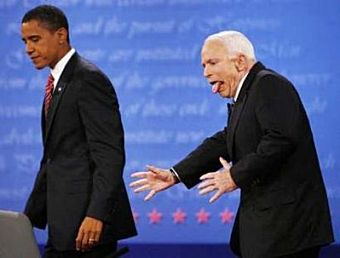
the 2008 presidential race
summed up in a single photograph
Making Light still from this clip
As Dwight Moody once said, “The best way to show that a stick is
crooked is not to denounce or talk about it, but to lay a perfectly
straight stick alongside it.”
-
Fearguth (American Street)
_______________________
Ronald Reagan used to say that the most frightening nine words in the English language were "I'm from the government and I'm here to help." That is no longer true. This year, the most frightening eight words are "I'm John McCain and I approved this message."
-
Joe Klein
_______________________

Pie Town, New Mexico
Russell Lee
Bound for Glory: America in Color
1939-1943
(Library of Congress Exhibition)
_______________________
The Book Of Pleasures
the relationship between pleasure, desire and class struggle...
Raoul Vaneigem
Translated by John Fullerton
The long dark night of trade is all the illumination our inhuman history has ever known. It will lift as life dawns. Death stares at our passions and we mute them; we mesh our desires with what is inimical to life; and we base the greater part o f existence on the bloody search for profit and power. We have been doing it for centuries and we have had enough. We have had enough of revolutions dyed in blood by intellectuals. Violence too is changing sides.
Survival, going cheap these days in what is left of the exchange market, is the everyday production of misery, a totalitarian industry. It too is in what you call crisis, in fact the death spasm of this whole civilisation.
The only human thing this society based on commerce has made is the mould cast in parody of itself, which serves to propagate it world-wide. The fragmentation that exchange value imposes on life can only tolerate fragmented people, embryos shrivelling in society's incubators, creatures never to be masters of themselves, but slaves. Once cloaked in divinity, then fleshed in ideology, power is now revealed in its bare bones: Economics. If this carries all the bets, the game from now on must go against us....(more)
_______________________
 Jack Delano
Farm auction
Derby, Connecticut
1940
_______________________
Notes on the Class Struggle for the Rank and File
Our Needs Do Not Fit on Their Ballots
Chuck O'connell
Realism now consists in believing the fantasy that there are substantial differences between two presidential candidates both of whom take most of their financial contributions and advice from the corporate sector, call for an expansion of the military by 100,000 troops, support a U.S. missile system in Poland, advocate a greater war in Afghanistan, back military strikes in Pakistan, take a bellicose line on Iran, and will not provide universal health care, repeal the Taft-Hartley Act, and stop ICE raids against undocumented workers. How did we come to such absurdity?...(more)
_______________________
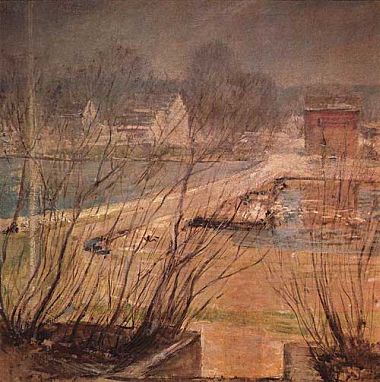
Frederick Childe Hassam
b. Oct 17, 1859
|

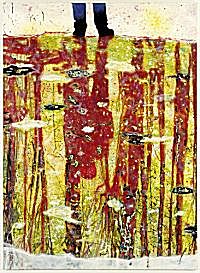




























































 Situated as thou art, in the very heart of stirring and living commerce, -- amid the fret and fever of speculation -- with the Bank, and the `Change, and the India-house about thee, in the hey-day of present prosperity, with their important faces, as it were, insulting thee, their poor neighbour out of business -- to the idle and merely contemplative,to such as me, old house! there is a charm in thy quiet -- a cessation -- a coolness from business -- an indolence almost cloistral -- which is delightful! With what reverence have I paced thy great bare rooms and courts at eventide! They spoke of the past -- the shade of some dead accountant, with visionary pen in ear, would flit by me, stiff as in life. Living accounts and accountants puzzle me. I have no skill in figuring. But thy great dead tomes, which scarce three degenerate clerks of the present day could lift from their enshrining shelves with their old fantastic flourishes, and decorative rubric interlacing their sums in triple columniations, set down with formal superfluity of cyphers with pious sentences at the beginning, without which our religious ancestors never ventured to open a book of business, or bill of lading -- the costly vellum covers of some of them almost persuading us that we are got into some better library, are very agreeable and edifying spectacles. I can look upon these defunct dragons with complacency. Thy heavy odd-shaped ivory-handled penknives (our ancestors had every thing on a larger scale than we have hearts for) are as good as any thing from Herculaneum. The pounce-boxes of our days have gone retrograde.
Situated as thou art, in the very heart of stirring and living commerce, -- amid the fret and fever of speculation -- with the Bank, and the `Change, and the India-house about thee, in the hey-day of present prosperity, with their important faces, as it were, insulting thee, their poor neighbour out of business -- to the idle and merely contemplative,to such as me, old house! there is a charm in thy quiet -- a cessation -- a coolness from business -- an indolence almost cloistral -- which is delightful! With what reverence have I paced thy great bare rooms and courts at eventide! They spoke of the past -- the shade of some dead accountant, with visionary pen in ear, would flit by me, stiff as in life. Living accounts and accountants puzzle me. I have no skill in figuring. But thy great dead tomes, which scarce three degenerate clerks of the present day could lift from their enshrining shelves with their old fantastic flourishes, and decorative rubric interlacing their sums in triple columniations, set down with formal superfluity of cyphers with pious sentences at the beginning, without which our religious ancestors never ventured to open a book of business, or bill of lading -- the costly vellum covers of some of them almost persuading us that we are got into some better library, are very agreeable and edifying spectacles. I can look upon these defunct dragons with complacency. Thy heavy odd-shaped ivory-handled penknives (our ancestors had every thing on a larger scale than we have hearts for) are as good as any thing from Herculaneum. The pounce-boxes of our days have gone retrograde.